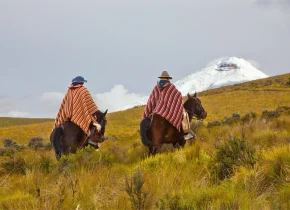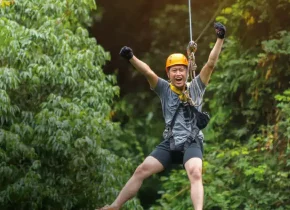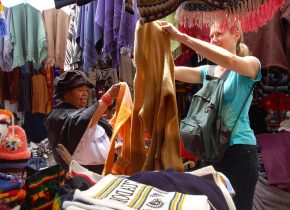This exquisite vessel, designed for 100 guests, offers an intimate glimpse into the Galapagos’ charm. Await a voyage filled with culinary delights and extraordinary adventures. Elevate your experience with the knowledge of our expert Galapagos guides, ensuring an adventure rich in discovery and luxury.
GO PACKAGE
Quito & Cruise in the Galapagos Islands
GO PACKAGE
Quito & Cruise in the Galapagos Islands
GO PACKAGE
Quito & Cruise in the Galapagos Islands
Previous slide
Next slide
Highlights
![]() Quito Cultural Heritage of Humanity and the Middle of the World.
Quito Cultural Heritage of Humanity and the Middle of the World.
![]() Start in Quito with a city view from the best five-star hotel, GO Quito Hotel.
Start in Quito with a city view from the best five-star hotel, GO Quito Hotel.
![]() Navigate the Galapagos Islands, an iconic conservation landmark.
Navigate the Galapagos Islands, an iconic conservation landmark.
Contact our travel experts.
Length of your trip
11 days
/10 nights
3 days land
8 days cruise
All meals included
onboard
From:
$5,505
per person in USD
(subject to change)
Choose your Ship
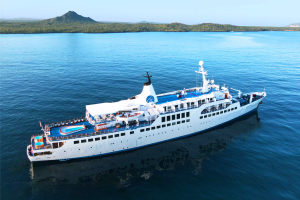
Boutique Expedition Cruise Galapagos Legend
Select your Itinerary
Day 1 - Welcome to Quito
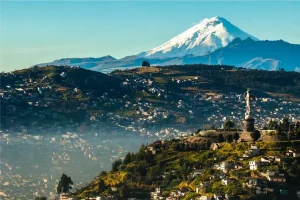
AM: Transfer Quito (airport – hotel).
Welcome to Quito. A representative will welcome you and transfer you to your hotel. You will have free time to explore the city, relax and settle in.
Accommodation: In the 5-Star GO Quito Hotel / Premium Room
Day 2 - Quito Old Town Tour & Middle of the World
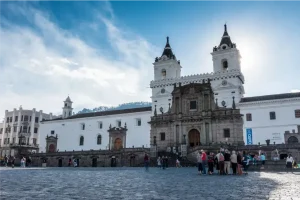
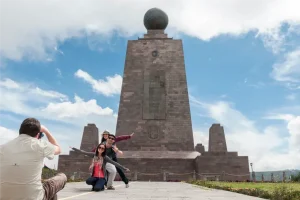
AM: Colonial Quito.
Stroll through the busy streets and squares of the most significant historic center of the Americas: a multi-ethnic, artistic, and UNESCO World Heritage Site.
PM: The Middle of the World.
Afterward, our guide will visit the Middle of the World Complex at latitude 0*0*0. Return to the hotel for the night.
Accommodation: In the 5-Star GO Quito Hotel / Premium Room
Day 3 - Welcome to Galapagos & Santa Cruz Island
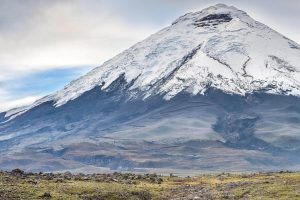
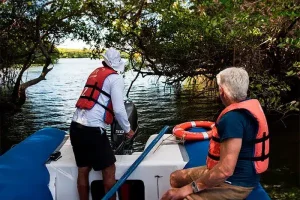
✈ Departure from either Quito or Guayaquil to Baltra Island is a 2 1⁄2 hour flight. Upon arrival in the Galapagos, passengers are greeted at the airport by our knowledgeable guides who will accompany them on a short ten-minute bus ride to the pier where they will board the Galapagos Legend.
PM: Highlands Tortoise Reserve (Santa Cruz Island) In the central highlands of Santa Cruz Island, we have our best opportunity to interact at close quarters with totally wild, Galapagos giant tortoises. A short walk among these huge, 600 lb, reptiles will also offer the chance for more highland species, especially several species of the famed finches.
Day 4 - Genovesa Island
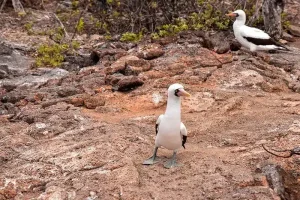
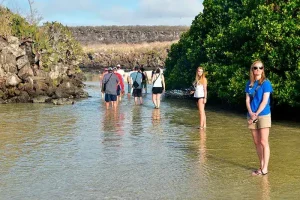
AM: El Barranco Prince Philip’s Steps (Genovesa Island) Be marvel at the variety of sea life that uses the crevices of the lava cliffs for shelter. Red-billed Tropic birds fly overhead, and a small colony of fur seals may be found near the landing site. You will be dropped off at a steep stairway that begins on rocks at the foot of a path that leads through a seabird colony full of Nazca and Red-footed Boobies.
PM: Darwin Bay (Genovesa Island) From within the flooded caldera of Tower Island, we set foot onto a sandy beach to be greeted by swallow-tailed gulls, often said to be the most beautiful gull in the world. On the trail, we can see nesting red-footed boobies and great frigate birds.
Day 5 - South Plaza Island & Santa Fe Island
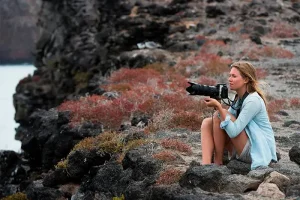
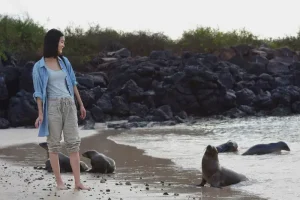
AM: South Plaza Island Sea lions, swallow-tailed gulls, and land iguanas are all at the landing site. The small island is covered with a carpet of a red succulent studded with Opuntia cacti. At the cliff edge, we spend time watching birds like frigate birds, flocks of Galapagos shearwaters, and particular note, flights of displaying red-bellied tropic birds.
PM: Santa Fe Island After a fabulous snorkel in the turquoise waters of the protected bay, we may have enjoyed time with sea lions, turtles, reef sharks and spotted eagle rays. Landing on a sandy beach, we watch the abundant sea lions there with us and begin a walk past a forest of island-endemic giant Opuntia cacti, and we can watch the Santa Fe land of Iguana.
Day 6 - Santa Cruz Island & Mosquera Islet
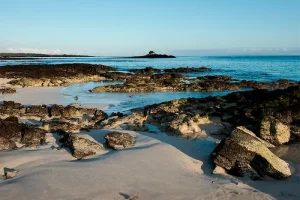
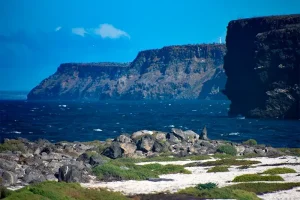
AM: Bachas Beach Named for some wrecked World War II barges whose ribs are still visible in the sand, is a visitor site that offers great swimming, a lovely walk along the shore, and a visit to a lagoon behind the high tide line with wading birds, marine iguanas, and sometimes even flamingos.
Charles Darwin: Research Station We visit the Station where the Galapagos giant tortoise breeding program takes place as part of our efforts to preserve the fragile Galapagos environment.
PM: Mosquera Islet This tiny, low-lying islet, converted into coral sand, is set between the north and south Seymour Islands. It’s home to a group of sea lions that come to laze on the soft white sand, it’s an excellent spot to observe shorebirds, herons, lava gulls, and boobies. Snorkeling or diving here, one can often see sharks, rays, and barracudas.
Day 7 - Santiago Island & Rabida Island
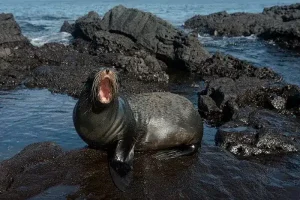
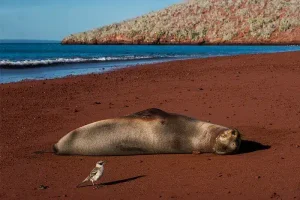
AM: Egas Port (Santiago Island). The black volcanic sand sets this landing apart from most. It’s best known for the dramatic shoreline, where we meet a host of species that choose to live between land and sea. Among these are the endemic Galapagos fur seals, which maintain a small colony at the end of our walk.
PM: Rabida Island Lying at the archipelago’s heart, this dramatic island with a distinctive red-sand beach is home to sea lions, mockingbirds, finches, endemic Galapagos doves, and vermilion flycatchers. A walk takes us through a forest of palo santo and cacti to a beautiful overview of the bay.
Day 8 - Isabela Island
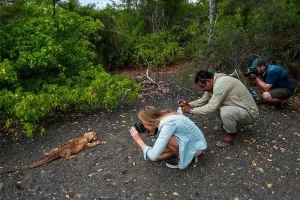
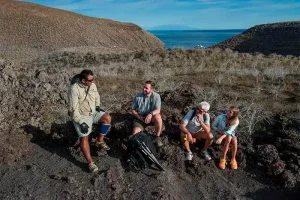
AM: Urbina Bay (Isabela Island) At the far end of a long level hike, we arrive at a strange phenomenon where large blocks of coral lie completely exposed after a dramatic geological uplift in 1954. Located at the western base of Alcedo Volcano, we hope to run into a few impressive land iguanas and some volcanoes endemic to Galapagos giant tortoises during the wet season.
PM: Tagus Cove (Isabela Island) a historic pirate hideout and anchorage. Visited by Charles Darwin and the HMS Beagle in 1835. Hike past Darwin Lake and the stunning volcanic landscape, revealing Isabela island’s dramatic northern volcanoes. Snorkel along a submerged wall with turtles, fish, penguins, and flightless cormorants. Enjoy a panga ride or kayak for added excitement!
Day 9 - Fernandina Island & Isabela Island
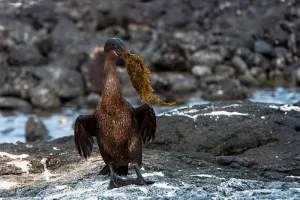
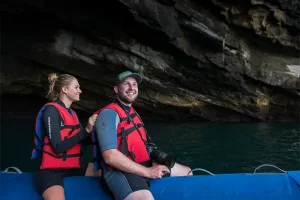
AM: Punta Espinosa (Fernandina Island) Pristine Fernandina, the marine iguana capital. Its desolate volcanic backdrop hosts a massive concentration of these enigmatic reptiles. Surprisingly, Galapagos penguins share the same shoreline. Snorkeling offers an exciting opportunity to witness marine iguanas feeding underwater alongside penguins, turtles, and unique flightless cormorants.
PM: Punta Vicente Roca (Isabela Island) Spectacular site, surrounded by immense cliffs of an eroded volcano. Studded with resting seabirds like brown noddies and Nazca boobies. Superb snorkeling with unique fish species. Swim with penguins and green turtles.
Day 10 - Santa Cruz Island
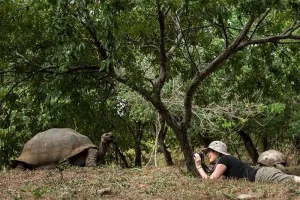
AM: Highlands (Santa Cruz Island) In the central highlands of Santa Cruz Island, we have our best opportunity to interact at close quarters with totally wild, Galapagos giant tortoises. A short walk among these huge, 600 lb, reptiles will also offer the chance for more highland species, especially several species of the famed finches.
✈ Baltra Island Airport After the visit, passengers will be transferred to the airport for their return flight to Guayaquil or Quito.
Day 11 - Back to Quito
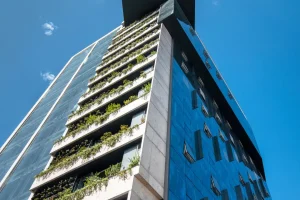
AM: Transfer to Quito airport.
Transfer to Quito airport, or guests can also extend their stay in Ecuador with other land tours we offer.
Accommodation: In the 5-Star Go Quito Hotel / Premium Room
Wildlife by expedition
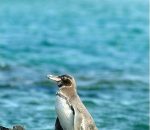
Galapagos Penguin
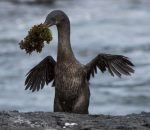
Flightless Cormorant
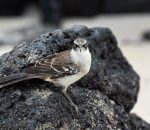
Mockingbird
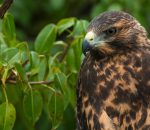
Galapagos Hawk
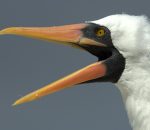
Nazca Booby
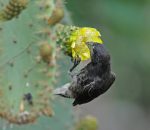
Darwin Finch
Day 1 - Welcome to Quito

AM: Transfer Quito (airport – hotel).
Welcome to Quito. A representative will welcome you and transfer you to your hotel. You will have free time to explore the city, relax and settle in.
Accommodation: In the 5-Star GO Quito Hotel / Premium Room
Day 2 - Quito Old Town Tour & Middle of the World


AM: Colonial Quito.
Stroll through the busy streets and squares of the most significant historic center of the Americas: a multi-ethnic, artistic, and UNESCO World Heritage Site.
PM: The Middle of the World.
Afterward, our guide will visit the Middle of the World Complex at latitude 0*0*0. Return to the hotel for the night.
Accommodation: In the 5-Star GO Quito Hotel / Premium Room
Day 3 - Welcome to Galapagos & Mosquera Islet


✈ Departure from either Quito or Guayaquil to Baltra Island is a 2 1⁄2 hour flight. Upon arrival in the Galapagos, passengers are greeted at the airport by our knowledgeable guides who will accompany them on a short ten-minute bus ride to the pier where they will board the Galapagos Legend.
PM: Mosquera Islet This tiny, low-lying islet, converted into coral sand, is set between the north and south Seymour Islands. It’s home to a group of sea lions that come to laze on the soft white sand, it’s an excellent spot to observe shorebirds, herons, lava gulls, and boobies. Snorkeling or diving here, one can often see sharks, rays, and barracudas.
Day 4 - Santiago Island & Rabida Island


AM: Egas Port (Santiago Island). The black volcanic sand sets this landing apart from most. It’s best known for the dramatic shoreline, where we meet a host of species that choose to live between land and sea. Among these are the endemic Galapagos fur seals, which maintain a small colony at the end of our walk.
PM: Rabida Island Lying at the archipelago’s heart, this dramatic island with a distinctive red-sand beach is home to sea lions, mockingbirds, finches, endemic Galapagos doves, and vermilion flycatchers. A walk takes us through a forest of palo santo and cacti to a beautiful overview of the bay.
Day 5 - Isabela Island


AM: Urbina Bay (Isabela Island) At the far end of a long level hike, we arrive at a strange phenomenon where large blocks of coral lie completely exposed after a dramatic geological uplift in 1954. Located at the western base of Alcedo Volcano, we hope to run into a few impressive land iguanas and some volcanoes endemic to Galapagos giant tortoises during the wet season.
PM: Tagus Cove (Isabela Island) a historic pirate hideout and anchorage. Visited by Charles Darwin and the HMS Beagle in 1835. Hike past Darwin Lake and stunning volcanic landscape, revealing Isabela island’s dramatic northern volcanoes. Snorkel along a submerged wall with turtles, fish, penguins, and flightless cormorants. Enjoy a panga ride or kayak for added excitement!
Day 6 - Fernandina Island & Isabela Island


AM: Punta Espinosa (Fernandina Island) Pristine Fernandina, the marine iguana capital. Its desolate volcanic backdrop hosts a massive concentration of these enigmatic reptiles. Surprisingly, Galapagos penguins share the same shoreline. Snorkeling offers an exciting opportunity to witness marine iguanas feeding underwater, alongside penguins, turtles, and unique flightless cormorants.
PM: Punta Vicente Roca (Isabela Island) Spectacular site, surrounded by immense cliffs of an eroded volcano. Studded with resting seabirds like brown noddies and Nazca boobies. Superb snorkeling with unique fish species. Swim with penguins and green turtles.
Day 7 - Santa Cruz Island & North Seymour Island

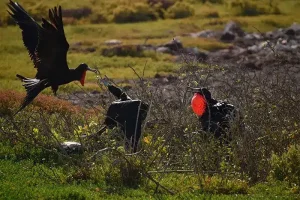
AM: Highlands turtle Reserve – In the central highlands of Santa Cruz Island, we have our best opportunity to interact at close quarters with totally wild, Galapagos giant tortoises. A short walk among these huge, 600 lb, reptiles will also offer the chance for more highlands species, especially several species of the famed finches.
Charles Darwin Research Station – We visit the Station where the Galapagos giant tortoise breeding program takes places as part of our efforts to preserve the fragile Galapagos environment.
PM: North Seymour Island This flat, uplifting, island is an important spot to see both magnificent and great frigate bird males courting the females and, we will also likely see courting blue-footed boobies too. Sea lions, swallow-tailed gulls, crashing surf and distant views of the Daphne Islands top off a great visit.
Day 8 - Bartolome Island & Santiago Island
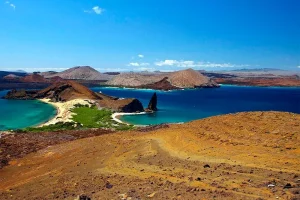
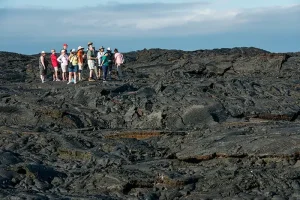
AM: Bartolome Island Considered the most iconic landscape of the entire archipelago the view from the top of Bartolome Island, overlooking the famous Pinnacle Rock and the austere Santiago Island, Our subsequent snorkel here might put us face to face with Galapagos penguins, white- tipped reef sharks, and playful sea lions.
PM: Sullivan Bay (Santiago Island) Visitors are always enthralled by the amazing beds of pahoehoe lava from the recent flow on the island. It is a landscape and macro photographer’s dream. As we hike over the lava, we will discuss the importance of pioneering plants such as the tiny Mollugo.
Day 9 - San Cristobal Island
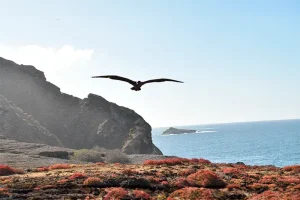
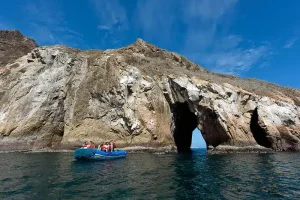
AM: Punta Pitt (San Cristobal Island) This is the only place on the islands where we will enjoy the chance to see all three of the booby species in the same place. The red-footed will be perched on the Cordia lutea and small trees, the Nazca ́s on the ground near the cliff edge, and the blue-footed will be further inland. Frigate birds will be all around and the views are breathtaking.
PM: Cerro Brujo (San Cristobal Island) From our dinghy ride, as we head to shore, we are first humbled by the immensity of the stunning cliffs of the Sorcerer’s Hill. You can enjoy simply sharing the beach with sea lions, snorkeling from shore, or walking to a hidden lagoon where you might spot black-necked stilts, ruddy turnstones, whimbrels, and white-cheeked pintails.
Day 10 - San Cristobal Island
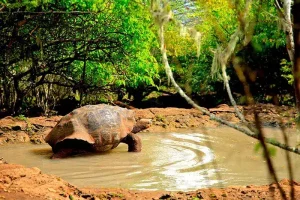
AM: Cerro Colorado (San Cristobal Island) In the moist highlands of San Cristobal, we will visit the giant tortoise breeding center “La Galapaguera” to witness the most iconic creature of the archipelago in its various life stages. The aim of the reserve is to help restore populations of the threatened San Cristobal tortoise back into the wild. In town, there are shops to purchase local handicrafts and souvenirs.
✈San Cristobal Airport After the visit, passengers will be transferred to the airport for their return flight to Quito.
Day 11 - Back to Quito

AM: Transfer to Quito airport.
Transfer to Quito airport, or guests can also extend their stay in Ecuador with other land tours we offer.
Accommodation: In the 5-Star Go Quito Hotel / Premium Room
Wildlife by expedition

Galapagos Penguin

Flightless Cormorant

Mockingbird

Galapagos Hawk

Nazca Booby

Darwin Finch
Day 1 - Welcome to Quito

AM: Transfer Quito (airport – hotel).
Welcome to Quito. A representative will welcome you and transfer you to your hotel. You will have free time to explore the city, relax and settle in.
Accommodation: In the 5-Star GO Quito Hotel / Premium Room
Day 2 - Quito Old Town Tour & Middle of the World


AM: Colonial Quito.
Stroll through the busy streets and squares of the most significant historic center of the Americas: a multi-ethnic, artistic, and UNESCO World Heritage Site.
PM: The Middle of the World.
Afterward, our guide will visit the Middle of the World Complex at latitude 0*0*0. Return to the hotel for the night.
Accommodation: In the 5-Star GO Quito Hotel / Premium Room
Day 3 - Welcome to Galapagos & North Seymour Island


AM: Departure from either Quito or Guayaquil to Baltra Island is a 2 1⁄2 hour flight. Upon arrival in the Galapagos, passengers are greeted at the airport by our knowledgeable guides who will accompany them on a short 10 minute bus ride to the pier where they will board the Galapagos Legend.
PM: North Seymour Island This flat, uplifting, island is an important spot to see both magnificent and great frigate bird males courting the females and, we will also likely see courting blue-footed boobies too. Sea lions, swallow-tailed gulls, crashing surf and distant views of the Daphne Islands top off a great visit.
Day 4 - Bartolome Island & Santiago Island


AM: Bartolome Island Considered the most iconic landscape of the entire archipelago the view from the top of Bartolome Island, overlooking the famous Pinnacle Rock and the austere Santiago Island, Our subsequent snorkel here might put us face to face with Galapagos penguins, white-tipped reef sharks, and playful sea lions.
PM: Sullivan Bay (Santiago Island) Visitors are always totally enthralled by the amazing beds of pahoehoe lava from the recent flow on the island. It is a landscape and macro photographer’s dream. As we hike over the lava, we will discuss the importance of pioneering plants such as the tiny Mollugo.
Day 5 - San Cristobal Island


AM: Punta Pitt (San Cristobal Island) This is the only place on the islands where we will enjoy the chance to see all three of the booby species in the same place. The red-footed will be perched on the Cordia lutea and small trees, the Nazca ́s on the ground near the cliff edge, and the blue-footed will be further inland. Frigate birds will be all around and the views are breathtaking.
PM: Cerro Brujo (San Cristobal Island) From our dinghy ride, as we head to shore, we are first humbled by the immensity of the stunning cliffs of the Sorcerer’s Hill. You can enjoy simply sharing the beach with sea lions, snorkeling from shore, or walking to a hidden lagoon where you might spot black-necked stilts, ruddy turnstones, whimbrels, and white-cheeked pintails.
Day 6 - San Cristobal Island

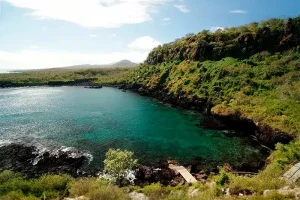
AM: Cerro Colorado (San Cristobal Island) In the moist highlands of San Cristobal, we will visit the giant tortoise breeding center “La Galapaguera” to witness the archipelago’s most iconic creature in its various life stages. The reserve aims to help restore the threatened San Cristóbal tortoise populations back into the wild. In town, there are shops to purchase local handicrafts and souvenirs.
PM: Interpretation Center & Frigatebird Hill (San Cristobal Island) The interpretation center is full of interesting information and offers the perfect overview of the formation of the Galapagos. Following a hike to Frigate bird Hill (Cerro Tijeretas), we will have a great look at both species of frigate birds, with the bonus of a beautiful view of the bay below.
Day 7 - Española Island

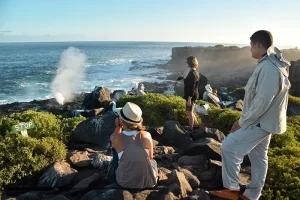
AM: Gardner Bay (Española Island) One of the most stunning beaches in the Galapagos. The long, white, sandy beach, lapped by turquoise waters, is home to a colony of Galapagos sea lions. Hood mockingbirds are endemic to this particular island. We can also snorkel here from the beach, in the bay’s shallows.
PM: Punta Suarez (Española Island) is a naturalist’s paradise. The oldest extant island in the archipelago is our only opportunity to commune with the endemic wave albatross during their breeding season between April and December. With luck, we can watch their complex courtship display.
Day 8 - Floreana Island
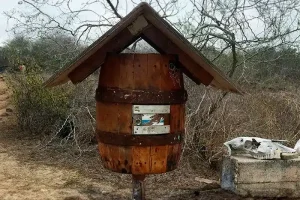
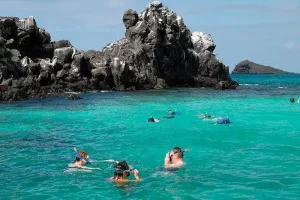
AM: Post Office (Floreana Island) The famous Post Office Barrel. Claimed to have been first set up in 1793 by Captain James Colnett. The system involved whalers and fur sealers would leave addressed letters in the barrel to be picked up by homeward-bound colleagues. Actually, visitors often take letters and hand-deliver them to their home countries.
PM: Cormoran & Devil’s Crown (Floreana Island) Our walk takes us to a large, shallow lagoon, often inhabited by a variable number of shockingly pink greater flamingos. We arrive at a powdery white beach, a nesting area for green turtles. Devil’s Crown is one of the favorite snorkeling sites on the islands.
Day 9 - Santa Cruz Island
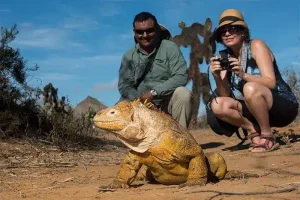
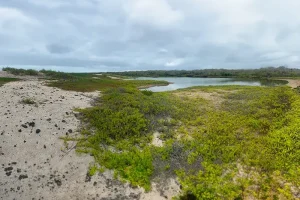
AM: Dragon Hill (Santa Cruz Island) Arriving at a small lava dock, our first encounter is with marine iguanas that blend perfectly with the dark rock. Walking past a large prickly pear cacti, we arrive at one end of a long, sickle-shaped beach with Dragon Hill standing in the distance. Our walk takes us on a circular path, past a shallow lake where flamingos frequently come to feed.
PM: Punta Bowditch (Santa Cruz Island) Feel the indescribable feeling of being where no one else has. Relax on a powdery beach. Snorkel around turquoise water islets and hike beside salt pools and dried white corals. Be one of the first humans –to visit Punta Bowditch at Galapagos Legend.
Day 10 - Highlands Tortoise
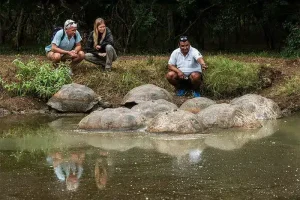
AM: Highlands (Santa Cruz Island) In the central highlands of Santa Cruz Island, we have our best opportunity to interact at close quarters with totally wild, Galapagos giant tortoises. A short walk among these huge, 600lb, reptiles will also offer the chance for more highland species, especially several species of the famed finches.
✈Baltra Island Airport After the visit, passengers will be transferred to the airport for their return flight to Guayaquil or Quito.
Day 11 - Back to Quito

AM: Transfer to Quito airport.
Transfer to Quito airport, or guests can also extend their stay in Ecuador with other land tours we offer.
Accommodation: In the 5-Star Go Quito Hotel / Premium Room
Wildlife by expedition

Galapagos Penguin
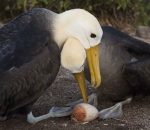
Galapagos Albatross

Mockingbird

Galapagos Hawk

Nazca Booby

Darwin Finch
Day 1 - Welcome to Quito

AM: Transfer Quito (airport – hotel).
Welcome to Quito. A representative will welcome you and transfer you to your hotel. You will have free time to explore the city, relax and settle in.
Accommodation: In the 5-Star GO Quito Hotel / Premium Room
Day 2 - Quito Old Town Tour & Middle of the World


AM: Colonial Quito.
Stroll through the busy streets and squares of the most significant historic center of the Americas: a multi-ethnic, artistic, and UNESCO World Heritage Site.
PM: The Middle of the World.
Afterward, our guide will visit the Middle of the World Complex at latitude 0*0*0. Return to the hotel for the night.
Accommodation: In the 5-Star GO Quito Hotel / Premium Room
Day 3 - Welcome to Galapagos & San Cristobal Island


✈ Departure from either Quito or Guayaquil to Baltra Island is a 2 1⁄2 hour flight. Upon arrival in the Galapagos, passengers are greeted at the airport by our knowledgeable guides, who will accompany them on a short 10-minute bus ride to the pier, where they will board the Galapagos Legend.
PM: Interpretation Center & Frigatebird Hill (San Cristobal Island) The interpretation center is full of interesting information and offers the perfect overview of the formation of the Galapagos. Following a hike to Frigate bird Hill (Cerro Tijeretas), we will have a great look at both species of frigate birds, with the bonus of a beautiful view of the bay below.
Day 4 - Española Island
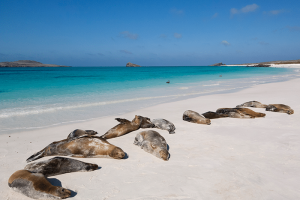

AM: Gardner Bay (Española Island) One of the most stunning beaches in the Galapagos. The long, white, sandy beach, lapped by turquoise waters, is home to a colony of Galapagos sea lions. Hood mockingbirds are endemic to this particular island. We can also snorkel here from the beach, in the shallows of the bay.
PM: Punta Suarez (Española Island) is a naturalist’s paradise. The oldest extant island in the archipelago is our only opportunity to commune with the endemic wave albatross during their breeding season between April and December. With luck, we can watch their complex courtship display.
Day 5 - Floreana Island

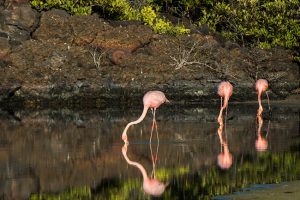
AM: Post Office (Floreana Island) The famous Post Office Barrel. Claimed to have been first set up in 1793 by Captain James Colnett. The system involved whalers and fur sealers would leave addressed letters in the barrel to be picked up by homeward-bound colleagues. Actually visitors often take letters and hand- deliver them to their home countries.
PM: Cormoran & Devil´s Crown (Floreana Island) Our walk takes us to a large, shallow lagoon, often inhabited by a variable number of shockingly pink greater flamingos. We arrive at a powdery white beach, a nesting area for green turtles. Devil’s Crown is one of the favorite snorkeling sites on the islands.
Day 6 - Santa Cruz Island


AM: Dragon Hill (Santa Cruz Island) Arriving at a small lava dock, our first encounter is with marine iguanas that blend in perfectly with the dark rock. Walking past a large prickly pear cacti, we arrive at one end of a long, sickle-shaped beach with Dragon Hill standing in the distance. Our walk takes us on a circular path, past a shallow lake where flamingos frequently come to feed.
PM: Punta Bowditch (Santa Cruz Island) Feel the indescribable feeling of being where no one else has. Relax on a powdery beach. Snorkel around turquoise water islets and hike beside salt pools and dried white corals. Be one of the first humans –to visit Punta Bowditch at Galapagos Legend.
Day 7 - Santa Cruz Island


AM: Highlands Tortoise Reserve – We have our best opportunity to interact at close quarters with totally wild, Galapagos giant tortoises. A short walk among these huge, 600lb, reptiles will also offer the chance for more highland species, especially several species. of the famed finches.
Charles Darwin Research Station – We visit the Station where the Galapagos giant tortoise breeding program takes places as part of our efforts to preserve the fragile Galapagos environment.
PM: Highlands (Santa Cruz Island) In the central highlands of Santa Cruz Island, we have our best opportunity to interact at close quarters with totally wild, Galapagos giant tortoises. A short walk among these huge, 600 lb, reptiles will also offer the chance for more highland species, especially many species of the famed finches.
Day 8 - Genovesa Island


AM: El Barranco (Genovesa Island) Be marveled at the variety of sea life that uses the crevices of the lava cliffs for shelter. Red-billed Tropic birds fly overhead, and a small colony of fur seals may be found near the landing site. You will be dropped off at a steep stairway that begins on rocks at the foot of a path that leads through a seabird colony entire of Nazca and Red-footed Boobies.
PM: Darwin Bay (Genovesa Island) From within the flooded caldera of Tower Island, we set foot onto a sandy beach to be greeted by swallow-tailed gulls, often said to be the most beautiful gull in the world. On the trail, we can see nesting red-footed boobies and great frigate birds.
Day 9 - South Plaza Island & Santa Fe Island


AM: South Plaza Island Sea lions, swallow-tailed gulls, and land iguanas are all present at the landing site. The small island is covered with a carpet of a red succulent studded with Opuntia cacti. At the cliff edge, we spend time watching birds like frigate birds, flocks of Galapagos shearwaters, and of particular note, flights of displaying red-billed tropic birds.
PM: Santa Fe Island After a fabulous snorkel in the turquoise waters of the protected bay, we may have enjoyed time with sea lions, turtles, reef sharks and spotted eagle rays. Landing on a sandy beach, we spend time watching the abundant sea lions there with us and . We begin a walk past a forest of island-endemic giant Opuntia cacti and we can watch the Santa Fe land Iguana.
Day 10 - Santa Cruz Island


AM: Bachas Beach (Santa Cruz Island) Named for some wrecked World War II barges whose ribs are still visible in the sand this visitor site offers great swimming, a lovely walk along the shore, and a visit to a lagoon behind the high tide line with wading birds, marine iguanas and sometimes even flamingoes. The two beaches are also favorite nesting sites for green turtles, often leaving tractor-like tracks in the sand.
✈Baltra Island Airport After the visit, passengers will be transferred to the airport for their return flight to Guayaquil or Quito.
Day 11 - Back to Quito

AM: Transfer to Quito airport.
Transfer to Quito airport, or guests can also extend their stay in Ecuador with other land tours we offer.
Accommodation: In the 5-Star Go Quito Hotel / Premium Room
Wildlife by expedition

Galapagos Albatross

Mockingbird

Galapagos Hawk

Nazca Booby

Darwin Finch
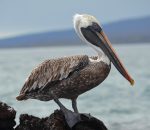
Galapagos Pelican
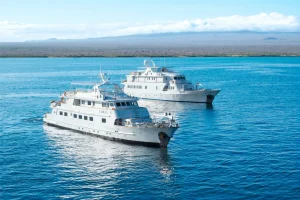
Expedition Yachts Coral I & Coral II
Coral I & Coral II are gorgeous and comfortable sister yachts. They offer charming social areas on three decks with outdoor and interior spaces that allow you to enjoy an intimate expedition experience on your way. They can accommodate 36 and 20 guests, respectively.
Select your Itinerary
Day 1 - Welcome to Quito

AM: Transfer Quito (airport – hotel).
Welcome to Quito. A representative will welcome you and transfer you to your hotel. You will have free time to explore the city, relax and settle in.
Accommodation: In the 5-Star GO Quito Hotel / Premium Room
Day 2 - Quito Old Town Tour & Middle of the World


AM: Colonial Quito.
Stroll through the busy streets and squares of the most significant historic center of the Americas: a multi-ethnic, artistic, and UNESCO World Heritage Site.
PM: The Middle of the World.
Afterward, our guide will visit the Middle of the World Complex at latitude 0*0*0. Return to the hotel for the night.
Accommodation: In the 5-Star GO Quito Hotel / Premium Room
Day 3 - Welcome to Galapagos & Santa Cruz Island
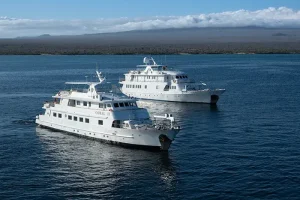
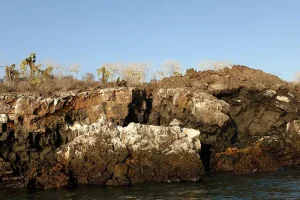
AM: Welcome to Galapagos. Departure from either Quito or Guayaquil to Baltra Island is a 2 1⁄2 hour flight. Upon arrival in the Galapagos, passengers are greeted at the airport by our knowledgeable guides who will accompany them on a short ten-minute bus ride to the pier where they will board the Coral I or Coral II.
PM: Punta Carrion (Santa Cruz Island). Dinghy ride at the entry of the Itabaca Channel in a lagoon with turquoise water, where we can observe sharks, blue-footed boobies, and different kinds of fish.
Day 4 - Genovesa Island


AM: El Barranco (Genovesa Island). Be marveled at the variety of sea life that uses the crevices of the lava cliffs for shelter. Red-billed Tropicbirds fly overhead, and a small colony of fur seals may be found near the landing site. You will be dropped off at a steep stairway that begins on rocks at the foot of a path that leads through a seabird colony full of Nazca and Red- footed Boobies.
PM: Darwin Bay (Genovesa Island). From within the flooded caldera of Tower Island, we set foot onto a sandy beach to be greeted by swallow- tailed gulls often said to be the most beautiful gull in the world. In the trail we can see at nesting red- footed boobies and great frigatebirds.
Day 5 - Rabida Island & Bartolome Island
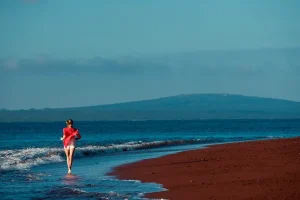

AM: Rabida Island. Lying at the archipelago’s heart, this dramatic island with a distinctive red-sand beach is home to sea lions, mockingbirds, finches, endemic Galapagos doves, and vermilion flycatchers. A walk takes us through a forest of palo santo and cacti to a beautiful overview of the bay.
PM: Bartolome Island. Considered the most iconic landscape of the entire archipelago the view from the top of Bartolome Island, overlooking the famous Pinnacle Rock and the austere Santiago Island, Our subsequent snorkel here might put us face to face with Galapagos penguins, white- tipped reef sharks, and playful sea lions.
Day 6 - Santa Cruz Island


AM: Highlands – In the central highlands of Santa Cruz Island, we have our best opportunity to interact at close quarters with totally wild, Galapagos giant tortoises. A short walk among these huge, 600lb, reptiles will also offer the chance for more species, especially several species of the famed finches.
Charles Darwin Research Station – We visit the Station where the Galapagos giant tortoise breeding program takes places as part o f our efforts to preserve the fragile Galapagos environment.
PM: Black Turtle Cove (Santa Cruz Island). On the north shore of Santa Cruz Island, accessible only by sea, four species of mangrove crowd and form an internal lagoon, turtles visit the calm waters, peaking their heads above the surface while fish, rays circle below. White-tipped reef sharks can be seen beneath the boat, plus sea birds, including pelicans, herons and egrets. This cove has been declared as a “turtle sanctuary”.
Day 7 - Isabela Island & Fernandina Island
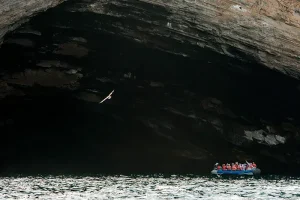
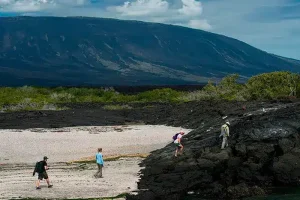
AM: Punta Vicente Roca (Isabela Island). Spectacular site, surrounded by immense cliffs of an eroded volcano. Studded with resting seabirds like brown noddies and Nazca boobies. Superb snorkeling with unique fish species. Swim with penguins and green turtles.
PM: Punta Espinosa (Fernandina Island). Pristine Fernandina, the marine iguana capital. Its desolate volcanic backdrop hosts a massive concentration of these enigmatic reptiles. Surprisingly, Galapagos penguins share the same shoreline. Snorkeling offers an exciting opportunity to witness marine iguanas feeding underwater, alongside penguins, turtles, and unique flightless cormorants.
Day 8 - Isabela Island


AM: Urbina Bay (Isabela Island). At the far end of a long level hike, we arrive at a strange phenomenon where large blocks of coral lie completely exposed after a dramatic geological uplift in 1954. Located at the western base of Alcedo Volcano, we hope to run into a few impressive land iguanas and some volcanoes endemic to Galapagos giant tortoises during the wet season
PM: Tagus Cove (Isabela Island). Tagus Cove, a historic pirate hideout and anchorage. Visited by Charles Darwin and the HMS Beagle in 1835. Hike past Darwin Lake and stunning volcanic landscape, revealing Isabela island’s dramatic northern volcanoes. Snorkel along a submerged wall with turtles, fish, penguins, and flightless cormorants. Enjoy a panga ride or kayak for added excitement!
Day 9 - Santiago Island

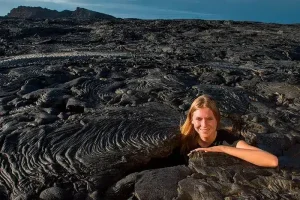
AM: Egas Port (Santiago Island). The black volcanic sand sets this landing apart from most, it’s best known for the dramatic shoreline where we meet a host of species that chose to live between land and sea. Among these are the endemic Galapagos fur seals, which maintain a small colony at the end of our walk.
PM: Sullivan Bay (Santiago Island). It has an extensive features relative to young pa-hoe-hoe lava flows formed during the last quarter of the 19th century. In the middle of the lava flow, older reddish-yellow-colored tuff cones appear. Mollugo plants with their yellow-to-orange whorled leaves usually grow out of the fissures. Walking on solidified lava gives the impression of being on another planet.
Day 10 - Santa Cruz Island & Baltra Island Airport

AM: Bachas Beach (Santa Cruz Island). Named for some wrecked World War II barges whose ribs are still visible in the sand this visitor site offers great swimming, a lovely walk along the shore, and a visit to a lagoon behind the high tide line with wading birds, marine iguanas and sometimes even flamingoes. The two beaches are also favorite nesting sites for green turtles which often leave tractor-like tracks in the sand.
Baltra Island Airport. After the visit, passengers will be transferred to the airport for their return flight to Guayaquil or Quito.
Day 11 - Back to Quito

AM: Transfer to Quito airport.
Transfer to Quito airport, or guests can also extend their stay in Ecuador with other land tours we offer.
Accommodation: In the 5-Star Go Quito Hotel / Premium Room
Wildlife by expedition

Galapagos Penguin

Flightless Cormorant

Mockingbird

Galapagos Hawk

Nazca Booby

Darwin Finch
Day 1 - Welcome to Quito

AM: Transfer Quito (airport – hotel).
Welcome to Quito. A representative will welcome you and transfer you to your hotel. You will have free time to explore the city, relax and settle in.
Accommodation: In the 5-Star GO Quito Hotel / Premium Room
Day 2 - Quito Old Town Tour & Middle of the World


AM: Colonial Quito.
Stroll through the busy streets and squares of the most significant historic center of the Americas: a multi-ethnic, artistic, and UNESCO World Heritage Site.
PM: The Middle of the World.
Afterward, our guide will visit the Middle of the World Complex at latitude 0*0*0. Return to the hotel for the night.
Accommodation: In the 5-Star GO Quito Hotel / Premium Room
Day 3 - Welcome to Galapagos & Santa Cruz Island
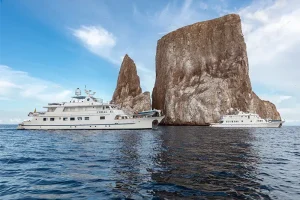

AM: Welcome to Galapagos. Departure from either Quito or Guayaquil to Baltra Island is a 2 1⁄2 hour flight. Upon arrival in the Galapagos, passengers are greeted at the airport by our knowledgeable guides who will accompany them on a short ten- minute bus ride to the pier where they will board the Coral I or Coral II.
PM: Black Turtle Cove (Santa Cruz Island). Here we can find four species of mangrove in the extensive tidal lagoon system that stretches for almost a mile inland. During our panga ride through the labyrinth we will spot many turtles, herons of several species, sharks and rays. The experience is otherworldly and seems to transport us back to the beginning of time.
Day 4 - Isabela Island & Fernandina Island


AM: Punta Vicente Roca (Isabela Island). Spectacular site, surrounded by immense cliffs of an eroded volcano. Studded with resting seabirds like brown noddies and Nazca boobies. Superb snorkeling with unique fish species. Swim with penguins and green turtles.
PM: Punta Espinosa (Fernandina Island). Pristine Fernandina, the marine iguana capital. Its desolate volcanic backdrop hosts a massive concentration of these enigmatic reptiles. Surprisingly, Galapagos penguins share the same shoreline. Snorkeling offers an exciting opportunity to witness marine iguanas feeding underwater, alongside penguins, turtles, and unique flightless cormorants.
Day 5 - Isabela Island


AM: Urbina Bay (Isabela Island). At the far end of a long level hike, we arrive at a strange phenomenon where large blocks of coral lie completely exposed after a dramatic geological uplift in 1954. Located at the western base of Alcedo Volcano, we hope to run into a few impressive land iguanas and some volcanoes endemic to Galapagos giant tortoises during the wet season.
PM: Tagus Cove (Isabela Island). Tagus Cove, a historic pirate hideout and anchorage. Visited by Charles Darwin and the HMS Beagle in 1835. Hike past Darwin Lake and stunning volcanic landscape, revealing Isabela island’s dramatic northern volcanoes. Snorkel along a submerged wall with turtles, fish, penguins, and flightless cormorants. Enjoy a panga ride or kayak for added excitement!
Day 6 - Santiago Island


AM: Egas Port (Santiago Island). The black volcanic sand sets this landing apart from most, it’s best known for the dramatic shoreline where we meet a host of species that chose to live between land and sea. Among these are the endemic Galapagos fur seals, which maintain a small colony at the end of our walk.
PM: Sullivan Bay (Santiago Island). It has an extensive features relative to young pa-hoe-hoe lava flows formed during the last quarter of the 19th century. In the middle of the lava flow, older reddish-yellow-colored tuff cones appear. Mollugo plants with their yellow-to-orange whorled leaves usually grow out of the fissures. Walking on solidified lava gives the impression of being on another planet.
Day 7 - Santa Cruz Island & North Seymour Island


AM: Bachas Beach – Named for some wrecked World War II barges whose ribs are still visible in the sand this visitor site offers great swimming, a lovely walk along the shore, and a visit to a lagoon behind the high tide line with wading birds, marine iguanas and sometimes even flamingoes.
Pitt Craters – The Pit Craters, geologically speaking, were not directly formed by volcanic action. They were created as a result of the collapse or sinking of surface materials into cracks or manholes.
PM: North Seymour Island. This flat, uplifting, island is an important spot to see both magnificent and great frigatebird males courting the females and, we will also likely see courting blue-footed boobies too. Sea lions, swallow-tailed gulls, crashing surf and distant views of the Daphne Islands top off a great visit.
Day 8 - Santa Cruz Island & Mosquera Islet
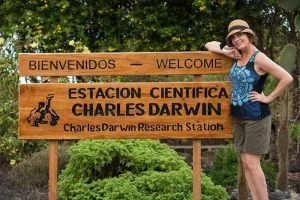
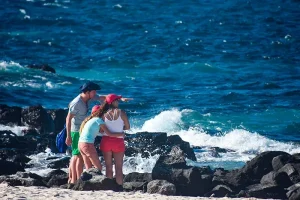
AM: Charles Darwin Research Station (Santa Cruz Island). Once home to the famous Lonesome George, the last tortoise of the Pinta race. The center is set in the Galapagos National Park Service where various interpretative buildings are available to visit. The grounds, with large stands of native vegetation are one of the better places to spot some of the seldom seen Darwinís finches.
PM: Mosquera Islet. This tiny, low-lying islet, converted into coral sand, is set between the north and south Seymour Islands. It’s home to a group of sea lions that come to laze on the soft white sand, it’s an excellent spot to observe shorebirds, herons, lava gulls, and boobies. Snorkeling or diving here, one can often see sharks, rays, and barracudas.
Day 9 - South Plaza Island & Santa Fe Island

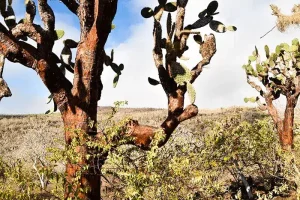
AM: South Plaza Island. Sea lions, swallow-tailed gulls, and land iguanas are all present at the landing site. The small island is covered with a carpet of a red succulent studded with Opuntia cacti. At the cliff edge, we spend time watching birds like frigatebirds, flocks of Galapagos shearwaters, and of particular note, flights of displaying red-billed tropicbirds.
PM: Santa Fe Island. After a fabulous snorkel in the turquoise waters of the protected bay, we may have enjoyed time with sea lions, turtles, reef sharks and spotted eagle rays. Landing on a sandy beach, we spend time watching the abundant sea lions there with us and . We begin a walk past a forest of island-endemic giant Opuntia cacti and we can watch the Santa Fe land Iguana.
Day 10 - Lobos Island & San Cristobal Airport
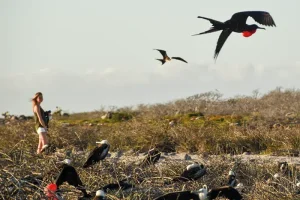
AM: Lobos Island. Isla Lobos is approximately 20 minutes by boat from Puerto Baquerizo Moreno. Once on the island, the trail is about 850 meters and there will be rocky trails and a nice & easy sand trail too. There is a small population of blue-footed boobies and great frigatebirds nests at this site.
San Cristobal Airport. After the visit, passengers will be transferred to the airport for their return flight to Guayaquil or Quito.
Day 11 - Back to Quito

AM: Transfer to Quito airport.
Transfer to Quito airport, or guests can also extend their stay in Ecuador with other land tours we offer.
Accommodation: In the 5-Star Go Quito Hotel / Premium Room
Wildlife by expedition

Galapagos Penguin

Flightless Cormorant

Mockingbird

Galapagos Hawk

Nazca Booby

Darwin Finch
Day 1 - Welcome to Quito

AM: Transfer Quito (airport – hotel).
Welcome to Quito. A representative will welcome you and transfer you to your hotel. You will have free time to explore the city, relax and settle in.
Accommodation: In the 5-Star GO Quito Hotel / Premium Room
Day 2 - Quito Old Town Tour & Middle of the World


AM: Colonial Quito.
Stroll through the busy streets and squares of the most significant historic center of the Americas: a multi-ethnic, artistic, and UNESCO World Heritage Site.
PM: The Middle of the World.
Afterward, our guide will visit the Middle of the World Complex at latitude 0*0*0. Return to the hotel for the night.
Accommodation: In the 5-Star GO Quito Hotel / Premium Room
Day 3 - Welcome to Galapagos & North Seymour Island


AM: Welcome to Galapagos. Departure from either Quito or Guayaquil to Baltra Island is a 2 1⁄2 hour flight. Upon arrival in the Galapagos, passengers are greeted at the airport by our knowledgeable guides who will accompany them on a short ten- minute bus ride to the pier where they will board the Coral I or Coral II.
PM: North Seymour Island. This flat, uplifting, island is an important spot to see both magnificent and great frigatebird males courting the females and, we will also likely see courting blue-footed boobies too. Sea lions, swallow-tailed gulls, crashing surf and distant views of the Daphne Islands top off a great visit.
Day 4 - Santa Cruz Island & Mosquera Islet


AM: Charles Darwin Research Station (Santa Cruz Island). Once home to the famous Lonesome George, the last tortoise of the Pinta race. The center is set in the Galapagos National Park Service where various interpretative buildings are available to visit. The grounds, with large stands of native vegetation are one of the better places to spot some of the seldom seen Darwinís finches.
PM: Mosquera Islet. This tiny, low-lying islet, converted into coral sand, is set between the north and south Seymour Islands. It’s home to a group of sea lions that come to laze on the soft white sand, it’s an excellent spot to observe shorebirds, herons, lava gulls, and boobies. Snorkeling or diving here, one can often see sharks, rays, and barracudas.
Day 5 - South Plaza Island & Santa Fe Island


AM: South Plaza Island. Sea lions, swallow-tailed gulls, and land iguanas are all present at the landing site. The small island is covered with a carpet of a red succulent studded with Opuntia cacti. At the cliff edge, we spend time watching birds like frigatebirds, flocks of Galapagos shearwaters, and of particular note, flights of displaying red-billed tropicbirds.
PM: Santa Fe Island. After a fabulous snorkel in the turquoise waters of the protected bay, we may have enjoyed time with sea lions, turtles, reef sharks and spotted eagle rays. Landing on a sandy beach, we spend time watching the abundant sea lions there with us and . We begin a walk past a forest of island-endemic giant Opuntia cacti and we can watch the Santa Fe land Iguana
Day 6 - Lobos Island & San Cristobal Island


AM: Lobos Island. Isla Lobos is approximately 20 minutes by boat from Puerto Baquerizo Moreno. Once on the island, the trail is about 850 meters and there will be rocky trails and a nice & easy sand trail too. There is a small population of blue-footed boobies and great frigatebirds nests at this site.
PM: Interpretation Center & Frigatebird Hill (San Cristobal Island). The interpretation center is full of interesting information and offers a perfect view of the formation of the Galapagos. After a hike to Cerro Tijeretas, we will have a great view of the two species of frigate birds, along with a beautiful view of the bay.
Day 7 - San Cristobal Island


AM: Kicker Rock – This ancient and eroded volcanic tuff lava named Leon Dormido or Kicker Rock, is formed from two rocks approximately 148 m, named for its resemblance to a sleeping lion.
Cerro Brujo – From our dinghy ride, as we head to shore, we are first humbled by the immensity of the stunning cliffs of the Sorcerer’s Hill. You can enjoy simply sharing the beach with sea lions, snorkelling from shore, or taking a walk to a hidden lagoon.
PM: Punta Pitt (San Cristobal Island). This is the only place on the islands where we will enjoy the chance to see all three of the booby species in the same place. The red-foots will be perched on the Cordia lutea and small trees, the Nazca ́s on the ground near the cliff edge while the blue-foots will be a little further inland. Frigatebirds will be all around and the views are breathtaking.
Day 8 - Española Island


AM: Punta Suarez (Española Island). Punta Suarez is a naturalist ́s paradise. The oldes extant island in the archipelago is our only opportunity to commune with the endemic wave albatross during their breeding season between April and December. With luck, we can watch their complex courtship display.
PM: Gardner Bay (Española Island). One of the most stunning beaches in all of the Galapagos. The long, white, sandy beach, lapped by turquoise waters, home to a colony of Galapagos sea lions. Hood mockingbirds, endemic to this particular island. We can also snorkel here from the beach, in the shallows of the bay.
Day 9 - Floreana Island


AM: Cormoran or Champion (Floreana Island). Our walk takes us to a large, shallow lagoon, often inhabited by a variable number of shockingly pink greater flamingos. We arrive at a powdery white beach, a nesting area for green turtles.
PM: Post Office (Floreana Island). The famous Post Office Barrel. Claimed to have been first set up in 1793 by Captain James Colnett. The system involved whalers and fur sealers would leave addressed letters in the barrel to be picked up by homeward-bound colleagues. Actually visitors often take letters and hand-deliver them to their home countries.
Day 10 - Santa Cruz Island & San Cristobal Airport

AM: Highlands (Santa Cruz Island). Dry landing. In the Galapagos mountains, admire diverse bird species like finches, flycatchers, crakes, warblers, and egrets (often perched on tortoises’ shells). The journey to the reserve showcases the island’s contrasting ecosystems, from coastal areas to dense humid forests. Look out for Galapagos Giant tortoises wandering through pastures. This spot is a haven for birdwatchers, as it hosts a wide range.
San Cristobal Airport. After the visit, passengers will be transferred to the airport for return flight to Quito or Guayaquil.
Day 11 - Back to Quito

AM: Transfer to Quito airport.
Transfer to Quito airport, or guests can also extend their stay in Ecuador with other land tours we offer.
Accommodation: In the 5-Star Go Quito Hotel / Premium Room
Wildlife by expedition

Galapagos Penguin

Galapagos Albatross

Mockingbird

Galapagos Hawk

Nazca Booby

Darwin Finch
Day 1 - Welcome to Quito

AM: Transfer Quito (airport – hotel).
Welcome to Quito. A representative will welcome you and transfer you to your hotel. You will have free time to explore the city, relax and settle in.
Accommodation: In the 5-Star GO Quito Hotel / Premium Room
Day 2 - Quito Old Town Tour & Middle of the World


AM: Colonial Quito.
Stroll through the busy streets and squares of the most significant historic center of the Americas: a multi-ethnic, artistic, and UNESCO World Heritage Site.
PM: The Middle of the World.
Afterward, our guide will visit the Middle of the World Complex at latitude 0*0*0. Return to the hotel for the night.
Accommodation: In the 5-Star GO Quito Hotel / Premium Room
Day 3 - Welcome to Galapagos & San Cristobal Island


AM: Welcome to Galapagos. Departure from either Quito or Guayaquil to Baltra Island is a 2 1⁄2 hour flight. Upon arrival in the Galapagos, passengers are greeted at the airport by our knowledgeable guides who will accompany them on a short ten- minute bus ride to the pier where they will board the Coral I or Coral II.
PM: Interpretation Center & Frigatebird Hill (San Cristobal Island). The interpretation center is full of interesting information and offers a perfect view of the formation of the Galapagos. After a hike to Cerro Tijeretas, we will have a great view of the two species of frigate birds, along with a beautiful view of the bay.
Day 4 - San Cristobal Island


AM: Kicker Rock – This ancient and eroded volcanic tuff lava named Leon Dormido or Kicker Rock, is formed from two rocks approximately 148 m, named for its resemblance to a sleeping lion.
Cerro Brujo – From our dinghy ride, as we head to shore, we are first humbled by the immensity of the stunning cliffs of the Sorcerer’s Hill. You can enjoy simply sharing the beach with sea lions, snorkelling from shore, or taking a walk to a hidden lagoon.
PM: Punta Pitt (San Cristobal Island). This is the only place on the islands where we will enjoy the chance to see all three of the booby species in the same place. The red-foots will be perched on the Cordia lutea and small trees, the Nazca ́s on the ground near the cliff edge while the blue-foots will be a little further inland. Frigatebirds will be all around and the views are breathtaking.
Day 5 - Española Island


AM: Punta Suarez (Española Island). Punta Suarez is a naturalist ́s paradise. The oldes extant island in the archipelago is our only opportunity to commune with the endemic wave albatross during their breeding season between April and December. With luck, we can watch their complex courtship display.
PM: Gardner Bay (Española Island). One of the most stunning beaches in all of the Galapagos. The long, white, sandy beach, lapped by turquoise waters, home to a colony of Galapagos sea lions. Hood mockingbirds, endemic to this particular island. We can also snorkel here from the beach, in the shallows of the bay.
Day 6 - Floreana Island


AM: Cormoran or Champion (Floreana Island). Our walk takes us to a large, shallow lagoon, often inhabited by a variable number of shockingly pink greater flamingos. We arrive at a powdery white beach, a nesting area for green turtles.
PM: Post Office (Floreana Island). The famous Post Office Barrel. Claimed to have been first set up in 1793 by Captain James Colnett. The system involved whalers and fur sealers would leave addressed letters in the barrel to be picked up by homeward-bound colleagues. Actually visitors often take letters and hand-deliver them to their home countries.
Day 7 - Santa Cruz Island


AM: Highlands Tortoise Reserve – We have our best opportunity to interact at close quarters with totally wild, Galapagos giant tortoises. A short walk among these huge, 600lb, reptiles will also offer the chance for more highland species, especially several species. of the famed finches.
Charles Darwin Research Station – We visit the Station where the Galapagos giant tortoise breeding program takes places as part of our efforts to preserve the fragile Galapagos environment.
PM: Punta Carrion (Santa Cruz Island). Dinghy ride at the entry of the Itabaca Channel in a lagoon with turquoise water, where we can observe sharks, blue-footed boobies, and different kinds of fish.
Day 8 - Genovesa Island


AM: El Barranco (Genovesa Island). Be marveled at the variety of sea life that uses the crevices of the lava cliffs for shelter. Red-billed Tropicbirds fly overhead, and a small colony of fur seals may be found near the landing site. You will be dropped off at a steep stairway that begins on rocks at the foot of a path that leads through a seabird colony full of Nazca and Red- footed Boobies.
PM: Darwin Bay (Genovesa Island). From within the flooded caldera of Tower Island, we set foot onto a sandy beach to be greeted by swallow- tailed gulls often said to be the most beautiful gull in the world. In the trail we can see at nesting red-footed boobies and great frigatebirds.
Day 9 - Rabida Island & Bartolome Island


AM: Rabida Island. Lying at the archipelago’s heart, this dramatic island with a distinctive red-sand beach is home to sea lions, mockingbirds, finches, endemic Galapagos doves, and vermilion flycatchers. A walk takes us through a forest of palo santo and cacti to a beautiful overview of the bay.
PM: Bartolome Island. Considered the most iconic landscape of the entire archipelago the view from the top of Bartolome Island, overlooking the famous Pinnacle Rock and the austere Santiago Island, Our subsequent snorkel here might put us face to face with Galapagos penguins, white- tipped reef sharks, and playful sea lions.
Day 10 - Santa Cruz Island & Baltra Island Airport

AM: Pit Craters (Santa Cruz Island). The Pit Craters, geologically speaking, were not directly formed by volcanic action. They were created as a result of the collapse or sinking of surface materials into cracks or manholes. It’s a great place to spot vermilion fly catchers as we walk inside an endemic Scalesia forest. Great opportunity to observe giant tortoises.
Baltra Island Airport. After the visit, passengers will be transferred to the airport for their return flight to Guayaquil or Quito.
Day 11 - Back to Quito

AM: Transfer to Quito airport.
Transfer to Quito airport, or guests can also extend their stay in Ecuador with other land tours we offer.
Accommodation: In the 5-Star Go Quito Hotel / Premium Room
Wildlife by expedition

Galapagos Albatross

Mockingbird

Galapagos Hawk

Nazca Booby

Darwin Finch

Galapagos Pelican

A unique hotel that offers 151 elegant rooms and lofts with a view of the city, inspired by the Andes. They have a modern home automation system that integrates lighting and heating. It also has a wellness area with a heated pool, sauna, spa, yoga room and a beautiful orchid garden.
Go Quito Hotel, committed to social and environmental responsibility, seeks to reduce its impact through responsible practices to conserve resources, manage energy efficiency and support the well-being of guests and staff.
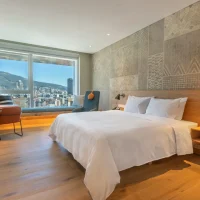
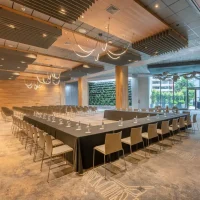
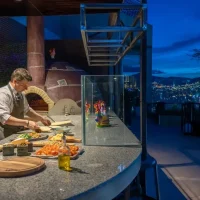

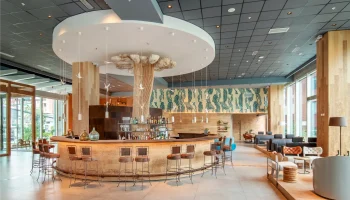
A unique hotel that offers 151 elegant rooms and lofts with a view of the city, inspired by the Andes. They have a modern home automation system that integrates lighting and heating. It also has a wellness area with a heated pool, sauna, spa, yoga room and a beautiful orchid garden.
GO Quito Hotel, committed to social and environmental responsibility, seeks to reduce its impact through responsible practices to conserve resources, manage energy efficiency and support the well-being of guests and staff.
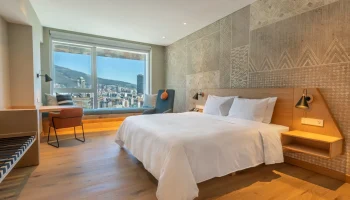
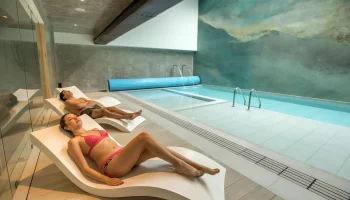
What´s Included?

Two daily excursions

Onboard activities

Aquatic activities

All meals included
Included in the rates
- High-quality Galapagos Islands cruise sharing double occupancy.
- On board: 2 daily excursions to the islands with multilingual naturalist guides, snorkeling opportunities (equipment included: fins, mask, snorkel), glass bottom boat (Available in Galapagos Legend), Lectures, and briefings; all meals onboard, welcome and farewell cocktails.
- Roundtrip transfers.
- 3 nights accommodation at Hotel GO Quito 5-stars.
- 3 breakfasts in Quito.
- Luxury Cabins with sea-view, air conditioning and private facilities ( Include one thermos and excursion bag per person.).
- All cabins are equipped with shampoo, conditioner, and shower gel. Body lotion is also available in balcony suites.
- Towels available for personal use: cabin, pool, and during excursions.
- Assistance with check-in and baggage handling at the airport (one piece of luggage, max. 20kls per person).
- Transfers to/from the airport and dinghy rides to/from ports in connection with scheduled flights.
Not included and to be invoiced onboard
Not included and to be invoiced onboard (net in US$ per person subject to change):
⊗ Air ticket from Quito / Guayaquil to Galapagos
– $ 495 per adult
– $ 375 per child under 12 years old
Issued by GO in connection with the cruise itinerary, arranging and securing logistics, luggage, and passenger transfers from airports to port – ship and back, documentation.
⊗ Galapagos Entrance Fee
– $ 100 per adult
– $ 50 for children under 12 years old.
⊗ CGG Migration Control Card: $20 per person.
Supplements & Discounts:
⊗ Single supplement: 50%, except in holiday seasons. (15 Dec – 5 Jan)
⊗ Triple occupancy: 25% discount for a third person sharing a cabin with two full-paying guests. (Only available on Galapagos Legend).
⊗ 50% discount for children under 12 years old sharing a cabin with two full-fare paying guests. 25% discount during the holiday season.
Supplements & Discounts
⊗ Single supplement: 50%, except in holiday seasons. (15 Dec – 5 Jan)
⊗ Triple occupancy: 25% discount for a third person sharing a cabin with two full-paying guests. (Only available on Galapagos Legend).
⊗ 50% discount for children under 12 years old sharing a cabin with two full-fare paying guests. 25% discount during the holiday season.
Optional onboard plus taxes
Optional onboard plus taxes (net per person in US$ subject to change):
- Internet: 4 or 5 days: $79.99. 7 days $99.99
- Wetsuit rental: $25 for 4 or 5 days cruise
- Kayak rental: $45 per use per person.
- Alcoholic and soft drinks: (packages available)
- Scuba diving during GO’s cruises: $315 half-day tour with 1-2 dives and equipment included (pre-booking required).
- Doctor: Medical assistance and medication are additional costs.
- Tips: Suggested per person per day $20 for crew / $10 for guide.
* Note 1: If any other ticket to/from Galapagos is used, a non-refundable operational fee of US$ 90.00 net per person will be added to provide a dinghy ride to/from the ship in Galapagos. GO is not responsible if passengers miss the cruise or other services due to delays in independent arrangements.
- High-quality Galapagos Islands cruise sharing double occupancy, Standard Plus, or Junior Suite cabins.
- On board: 2 daily excursions to the islands with multilingual naturalist guides, snorkeling opportunities, lectures, and briefings; all meals on board, welcome and farewell cocktails;
- Roundtrip transfers.
- 3 nights accommodation at Hotel GO Quito 5 stars.
- 3 breakfasts in Quito.
- All-inclusive cruises in ocean-view cabins with air conditioning and private facilities.
- Open decks to observe flora and fauna, briefings, lectures, and activities on board.
- Snorkeling possibilities, glass bottom boat.
- Snorkeling equipment: fins, mask, snorkel.
- Towels available for personal use: cabin, pool, and during excursions.
- All cabins are equipped with shampoo, conditioner, and shower gel. In addition, body lotion is available in the suites with a balcony.
- Assistance with check-in and baggage handling at the airport (one piece of luggage, max. 20kls per person).
- Transfers to/from the airport and dinghy rides to/from ports in connection with scheduled flights.
- All cabin categories include one thermos and excursion bag per person
Read More
Not included and be invoiced along with the cruise (net in US$ per person subject to change):
⊗ Air ticket from Quito / Guayaquil to Galapagos
– $ 495 per adult
– $ 375 per child under 12 years old
Issued by GO in connection with the cruise itinerary, arranging and securing logistics, luggage, and passenger transfers from airports to port – ship and back, documentation.
⊗ Galapagos Entrance Fee
– $ 100 per adult
– $ 50 for children under 12 years old.
⊗ CGG Migration Control Card: $20 per person.
Supplements & Discounts:
⊗ Single supplement: 50%, except in holiday seasons. (15 Dec – 5 Jan)
⊗ Triple occupancy: 25% discount for a third person sharing a cabin with two full-paying guests. (Only available on Galapagos Legend).
⊗ 50% discount for children under 12 years old sharing a cabin with two full-fare paying guests. 25% discount during the holiday season.
⊗ Single supplement: 50%, except in holiday seasons. (15 Dec – 5 Jan)
⊗ Triple occupancy: 25% discount for a third person sharing a cabin with two full-paying guests. (Only available on Galapagos Legend).
⊗ 50% discount for children under 12 years old sharing a cabin with two full-fare paying guests. 25% discount during the holiday season.
Optional onboard plus taxes (net per person in US$ subject to change):
- Internet: 4 or 5 days: $79.99. 7 days $99.99
- Wetsuit rental: $25 for 4 or 5 days cruise
- Kayak rental: $45 per use per person.
- Alcoholic and soft drinks: (packages available)
- Scuba diving during GO’s cruises: $315 half-day tour with 1-2 dives and equipment included (pre-booking required).
- Doctor: Medical assistance and medication are additional costs.
- Tips: Suggested per person per day $20 for crew / $10 for guide.
What to take on the trip
Essentials:
- Passport and Travel Documents
- Cash in US Dollars and bring credit or debit cards
- Your medications for the journey
- Ocean-Friendly Sunblock
- Insect repellent
- Waterproof small backpack
- Photo and video cameras
- Journal
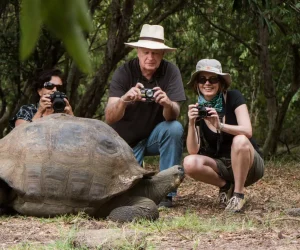
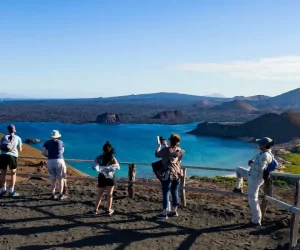
What to Wear?
- Water-resistant, closed-toe sport sandals
- Lightweight hiking shoes
- Lightweight hiking pants or shorts
- Long-sleeve shirts
- Bathing suits
- Warm sweater or fleece
- Wide-brimmed hat or cap
- Sunglasses
Essentials:
- Passport and Travel Documents
- Cash in US Dollars and bring credit or debit cards
- Your medications for the journey
- Ocean-Friendly Sunblock
- Insect repellent
- Waterproof small backpack
- Photo and video cameras
- Journal
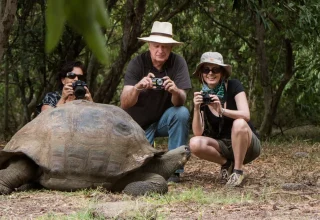
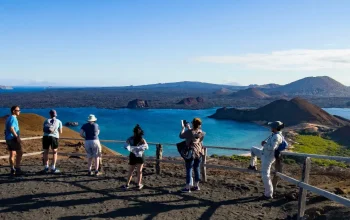
What to Wear?
- Water-resistant, closed-toe sport sandals
- Lightweight hiking shoes
- Lightweight hiking pants or shorts
- Long-sleeve shirts
- Bathing suits
- Warm sweater or fleece
- Wide-brimmed hat or cap
- Sunglasses
Extend your stay in Ecuador with other land tours we offer
Enjoy optional Full-Day Tours
Explore more of Ecuador with our additional land tours. Immerse yourself in the diverse landscapes, rich culture, and unique experiences this beautiful country has to offer.
Contact our travel experts.
![]() Quito Cultural Heritage of Humanity and the Middle of the World.
Quito Cultural Heritage of Humanity and the Middle of the World.
![]() Start in Quito with a city view from the best five star hotel, Go Quito Hotel.
Start in Quito with a city view from the best five star hotel, Go Quito Hotel.
![]() Navigate the Galapagos Islands, an iconic conservation landmark.
Navigate the Galapagos Islands, an iconic conservation landmark.
From:
$5,505
per person in USD (subject to change)
11 days
/10 nights
3 days land 8 days cruise
All meals included onboard
Galapagos Cruises
Choose your Ship
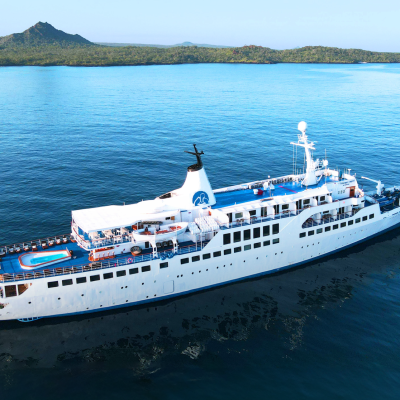
Boutique Expedition Cruise Galapagos Legend
This exquisite vessel, designed for 100 guests, offers an intimate glimpse into the Galapagos’ charm. Await a voyage filled with culinary delights and extraordinary adventures. Elevate your experience with the knowledge of our expert Galapagos guides, ensuring an adventure rich in discovery and luxury.
Select your Itinerary
Day 1 - Welcome to Quito

AM: Transfer Quito (airport – hotel).
Welcome to Quito. A representative will welcome you and transfer you to your hotel. You will have free time to explore the city, relax and settle in.
Accommodation: In the 5-Star GO Quito Hotel / Premium Room
Day 2 - Quito Old Town Tour & Middle of the World


AM: Colonial Quito.
Stroll through the busy streets and squares of the most significant historic center of the Americas: a multi-ethnic, artistic, and UNESCO World Heritage Site.
PM: The Middle of the World.
Afterward, our guide will visit the Middle of the World Complex at latitude 0*0*0. Return to the hotel for the night.
Accommodation: In the 5-Star GO Quito Hotel / Premium Room
Day 3 - Welcome to Galapagos & Santa Cruz Island


✈ Departure from either Quito or Guayaquil to Baltra Island is a 2 1⁄2 hour flight. Upon arrival in the Galapagos, passengers are greeted at the airport by our knowledgeable guides who will accompany them on a short ten-minute bus ride to the pier where they will board the Galapagos Legend.
PM: Highlands Tortoise Reserve (Santa Cruz Island) In the central highlands of Santa Cruz Island, we have our best opportunity to interact at close quarters with totally wild, Galapagos giant tortoises. A short walk among these huge, 600 lb, reptiles will also offer the chance for more highland species, especially several species of the famed finches.
Day 4 - Genovesa Island


AM: El Barranco Prince Philip’s Steps (Genovesa Island) Be marvel at the variety of sea life that uses the crevices of the lava cliffs for shelter. Red-billed Tropic birds fly overhead, and a small colony of fur seals may be found near the landing site. You will be dropped off at a steep stairway that begins on rocks at the foot of a path that leads through a seabird colony full of Nazca and Red-footed Boobies.
PM: Darwin Bay (Genovesa Island) From within the flooded caldera of Tower Island, we set foot onto a sandy beach to be greeted by swallow-tailed gulls, often said to be the most beautiful gull in the world. On the trail, we can see nesting red-footed boobies and great frigate birds.
Day 5 - South Plaza Island & Santa Fe Island


AM: South Plaza Island Sea lions, swallow-tailed gulls, and land iguanas are all at the landing site. The small island is covered with a carpet of a red succulent studded with Opuntia cacti. At the cliff edge, we spend time watching birds like frigate birds, flocks of Galapagos shearwaters, and particular note, flights of displaying red-bellied tropic birds.
PM: Santa Fe Island After a fabulous snorkel in the turquoise waters of the protected bay, we may have enjoyed time with sea lions, turtles, reef sharks and spotted eagle rays. Landing on a sandy beach, we watch the abundant sea lions there with us and begin a walk past a forest of island-endemic giant Opuntia cacti, and we can watch the Santa Fe land of Iguana.
Day 6 - Santa Cruz Island & Mosquera Islet


AM: Bachas Beach Named for some wrecked World War II barges whose ribs are still visible in the sand, is a visitor site that offers great swimming, a lovely walk along the shore, and a visit to a lagoon behind the high tide line with wading birds, marine iguanas, and sometimes even flamingos.
Charles Darwin: Research Station We visit the Station where the Galapagos giant tortoise breeding program takes place as part of our efforts to preserve the fragile Galapagos environment.
PM: Mosquera Islet This tiny, low-lying islet, converted into coral sand, is set between the north and south Seymour Islands. It’s home to a group of sea lions that come to laze on the soft white sand, it’s an excellent spot to observe shorebirds, herons, lava gulls, and boobies. Snorkeling or diving here, one can often see sharks, rays, and barracudas.
Day 7 - Santiago Island & Rabida Island


AM: Egas Port (Santiago Island). The black volcanic sand sets this landing apart from most. It’s best known for the dramatic shoreline, where we meet a host of species that choose to live between land and sea. Among these are the endemic Galapagos fur seals, which maintain a small colony at the end of our walk.
PM: Rabida Island Lying at the archipelago’s heart, this dramatic island with a distinctive red-sand beach is home to sea lions, mockingbirds, finches, endemic Galapagos doves, and vermilion flycatchers. A walk takes us through a forest of palo santo and cacti to a beautiful overview of the bay.
Day 8 - Isabela Island


AM: Urbina Bay (Isabela Island) At the far end of a long level hike, we arrive at a strange phenomenon where large blocks of coral lie completely exposed after a dramatic geological uplift in 1954. Located at the western base of Alcedo Volcano, we hope to run into a few impressive land iguanas and some volcanoes endemic to Galapagos giant tortoises during the wet season.
PM: Tagus Cove (Isabela Island) a historic pirate hideout and anchorage. Visited by Charles Darwin and the HMS Beagle in 1835. Hike past Darwin Lake and the stunning volcanic landscape, revealing Isabela island’s dramatic northern volcanoes. Snorkel along a submerged wall with turtles, fish, penguins, and flightless cormorants. Enjoy a panga ride or kayak for added excitement!
Day 9 - Fernandina Island & Isabela Island


AM: Punta Espinosa (Fernandina Island) Pristine Fernandina, the marine iguana capital. Its desolate volcanic backdrop hosts a massive concentration of these enigmatic reptiles. Surprisingly, Galapagos penguins share the same shoreline. Snorkeling offers an exciting opportunity to witness marine iguanas feeding underwater alongside penguins, turtles, and unique flightless cormorants.
PM: Punta Vicente Roca (Isabela Island) Spectacular site, surrounded by immense cliffs of an eroded volcano. Studded with resting seabirds like brown noddies and Nazca boobies. Superb snorkeling with unique fish species. Swim with penguins and green turtles.
Day 10 - Santa Cruz Island

AM: Highlands (Santa Cruz Island) In the central highlands of Santa Cruz Island, we have our best opportunity to interact at close quarters with totally wild, Galapagos giant tortoises. A short walk among these huge, 600 lb, reptiles will also offer the chance for more highland species, especially several species of the famed finches.
✈ Baltra Island Airport After the visit, passengers will be transferred to the airport for their return flight to Guayaquil or Quito.
Day 11 - Back to Quito

AM: Transfer to Quito airport.
Transfer to Quito airport, or guests can also extend their stay in Ecuador with other land tours we offer.
Accommodation: In the 5-Star Go Quito Hotel / Premium Room
Wildlife by expedition

Galapagos Penguin

Flightless Cormorant

Mockingbird

Galapagos Hawk

Nazca Booby

Darwin Finch
Day 1 - Welcome to Quito

AM: Transfer Quito (airport – hotel).
Welcome to Quito. A representative will welcome you and transfer you to your hotel. You will have free time to explore the city, relax and settle in.
Accommodation: In the 5-Star GO Quito Hotel / Premium Room
Day 2 - Quito Old Town Tour & Middle of the World


AM: Colonial Quito.
Stroll through the busy streets and squares of the most significant historic center of the Americas: a multi-ethnic, artistic, and UNESCO World Heritage Site.
PM: The Middle of the World.
Afterward, our guide will visit the Middle of the World Complex at latitude 0*0*0. Return to the hotel for the night.
Accommodation: In the 5-Star GO Quito Hotel / Premium Room
Day 3 - Welcome to Galapagos & Mosquera Islet


✈ Departure from either Quito or Guayaquil to Baltra Island is a 2 1⁄2 hour flight. Upon arrival in the Galapagos, passengers are greeted at the airport by our knowledgeable guides who will accompany them on a short ten-minute bus ride to the pier where they will board the Galapagos Legend.
PM: Mosquera Islet This tiny, low-lying islet, converted into coral sand, is set between the north and south Seymour Islands. It’s home to a group of sea lions that come to laze on the soft white sand, it’s an excellent spot to observe shorebirds, herons, lava gulls, and boobies. Snorkeling or diving here, one can often see sharks, rays, and barracudas.
Day 4 - Santiago Island & Rabida Island


AM: Egas Port (Santiago Island). The black volcanic sand sets this landing apart from most. It’s best known for the dramatic shoreline, where we meet a host of species that choose to live between land and sea. Among these are the endemic Galapagos fur seals, which maintain a small colony at the end of our walk.
PM: Rabida Island Lying at the archipelago’s heart, this dramatic island with a distinctive red-sand beach is home to sea lions, mockingbirds, finches, endemic Galapagos doves, and vermilion flycatchers. A walk takes us through a forest of palo santo and cacti to a beautiful overview of the bay.
Day 5 - Isabela Island


AM: Urbina Bay (Isabela Island) At the far end of a long level hike, we arrive at a strange phenomenon where large blocks of coral lie completely exposed after a dramatic geological uplift in 1954. Located at the western base of Alcedo Volcano, we hope to run into a few impressive land iguanas and some volcanoes endemic to Galapagos giant tortoises during the wet season.
PM: Tagus Cove (Isabela Island) a historic pirate hideout and anchorage. Visited by Charles Darwin and the HMS Beagle in 1835. Hike past Darwin Lake and stunning volcanic landscape, revealing Isabela island’s dramatic northern volcanoes. Snorkel along a submerged wall with turtles, fish, penguins, and flightless cormorants. Enjoy a panga ride or kayak for added excitement!
Day 6 - Fernandina Island & Isabela Island


AM: Punta Espinosa (Fernandina Island) Pristine Fernandina, the marine iguana capital. Its desolate volcanic backdrop hosts a massive concentration of these enigmatic reptiles. Surprisingly, Galapagos penguins share the same shoreline. Snorkeling offers an exciting opportunity to witness marine iguanas feeding underwater, alongside penguins, turtles, and unique flightless cormorants.
PM: Punta Vicente Roca (Isabela Island) Spectacular site, surrounded by immense cliffs of an eroded volcano. Studded with resting seabirds like brown noddies and Nazca boobies. Superb snorkeling with unique fish species. Swim with penguins and green turtles.
Day 7 - Santa Cruz Island & North Seymour Island


AM: Highlands turtle Reserve – In the central highlands of Santa Cruz Island, we have our best opportunity to interact at close quarters with totally wild, Galapagos giant tortoises. A short walk among these huge, 600 lb, reptiles will also offer the chance for more highlands species, especially several species of the famed finches.
Charles Darwin Research Station – We visit the Station where the Galapagos giant tortoise breeding program takes places as part of our efforts to preserve the fragile Galapagos environment.
PM: North Seymour Island This flat, uplifting, island is an important spot to see both magnificent and great frigate bird males courting the females and, we will also likely see courting blue-footed boobies too. Sea lions, swallow-tailed gulls, crashing surf and distant views of the Daphne Islands top off a great visit.
Day 8 - Bartolome Island & Santiago Island


AM: Bartolome Island Considered the most iconic landscape of the entire archipelago the view from the top of Bartolome Island, overlooking the famous Pinnacle Rock and the austere Santiago Island, Our subsequent snorkel here might put us face to face with Galapagos penguins, white- tipped reef sharks, and playful sea lions.
PM: Sullivan Bay (Santiago Island) Visitors are always enthralled by the amazing beds of pahoehoe lava from the recent flow on the island. It is a landscape and macro photographer’s dream. As we hike over the lava, we will discuss the importance of pioneering plants such as the tiny Mollugo.
Day 9 - San Cristobal Island


AM: Punta Pitt (San Cristobal Island) This is the only place on the islands where we will enjoy the chance to see all three of the booby species in the same place. The red-footed will be perched on the Cordia lutea and small trees, the Nazca ́s on the ground near the cliff edge, and the blue-footed will be further inland. Frigate birds will be all around and the views are breathtaking.
PM: Cerro Brujo (San Cristobal Island) From our dinghy ride, as we head to shore, we are first humbled by the immensity of the stunning cliffs of the Sorcerer’s Hill. You can enjoy simply sharing the beach with sea lions, snorkeling from shore, or walking to a hidden lagoon where you might spot black-necked stilts, ruddy turnstones, whimbrels, and white-cheeked pintails.
Day 10 - San Cristobal Island

AM: Cerro Colorado (San Cristobal Island) In the moist highlands of San Cristobal, we will visit the giant tortoise breeding center “La Galapaguera” to witness the most iconic creature of the archipelago in its various life stages. The aim of the reserve is to help restore populations of the threatened San Cristobal tortoise back into the wild. In town, there are shops to purchase local handicrafts and souvenirs.
✈San Cristobal Airport After the visit, passengers will be transferred to the airport for their return flight to Quito.
Day 11 - Back to Quito

AM: Transfer to Quito airport.
Transfer to Quito airport, or guests can also extend their stay in Ecuador with other land tours we offer.
Accommodation: In the 5-Star Go Quito Hotel / Premium Room
Wildlife by expedition

Galapagos Penguin

Flightless Cormorant

Mockingbird

Galapagos Hawk

Nazca Booby

Darwin Finch
Day 1 - Welcome to Quito

AM: Transfer Quito (airport – hotel).
Welcome to Quito. A representative will welcome you and transfer you to your hotel. You will have free time to explore the city, relax and settle in.
Accommodation: In the 5-Star GO Quito Hotel / Premium Room
Day 2 - Quito Old Town Tour & Middle of the World


AM: Colonial Quito.
Stroll through the busy streets and squares of the most significant historic center of the Americas: a multi-ethnic, artistic, and UNESCO World Heritage Site.
PM: The Middle of the World.
Afterward, our guide will visit the Middle of the World Complex at latitude 0*0*0. Return to the hotel for the night.
Accommodation: In the 5-Star GO Quito Hotel / Premium Room
Day 3 - Welcome to Galapagos & North Seymour Island


AM: Welcome to Galapagos. Departure from either Quito or Guayaquil to Baltra Island is a 2 1⁄2 hour flight. Upon arrival in the Galapagos, passengers are greeted at the airport by our knowledgeable guides who will accompany them on a short ten- minute bus ride to the pier where they will board the Coral I or Coral II.
PM: North Seymour Island. This flat, uplifting, island is an important spot to see both magnificent and great frigatebird males courting the females and, we will also likely see courting blue-footed boobies too. Sea lions, swallow-tailed gulls, crashing surf and distant views of the Daphne Islands top off a great visit.
Day 4 - Santa Cruz Island & Mosquera Islet


AM: Charles Darwin Research Station (Santa Cruz Island). Once home to the famous Lonesome George, the last tortoise of the Pinta race. The center is set in the Galapagos National Park Service where various interpretative buildings are available to visit. The grounds, with large stands of native vegetation are one of the better places to spot some of the seldom seen Darwinís finches.
PM: Mosquera Islet. This tiny, low-lying islet, converted into coral sand, is set between the north and south Seymour Islands. It’s home to a group of sea lions that come to laze on the soft white sand, it’s an excellent spot to observe shorebirds, herons, lava gulls, and boobies. Snorkeling or diving here, one can often see sharks, rays, and barracudas.
Day 5 - South Plaza Island & Santa Fe Island


AM: South Plaza Island. Sea lions, swallow-tailed gulls, and land iguanas are all present at the landing site. The small island is covered with a carpet of a red succulent studded with Opuntia cacti. At the cliff edge, we spend time watching birds like frigatebirds, flocks of Galapagos shearwaters, and of particular note, flights of displaying red-billed tropicbirds.
PM: Santa Fe Island. After a fabulous snorkel in the turquoise waters of the protected bay, we may have enjoyed time with sea lions, turtles, reef sharks and spotted eagle rays. Landing on a sandy beach, we spend time watching the abundant sea lions there with us and . We begin a walk past a forest of island-endemic giant Opuntia cacti and we can watch the Santa Fe land Iguana
Day 6 - Lobos Island & San Cristobal Island


AM: Lobos Island. Isla Lobos is approximately 20 minutes by boat from Puerto Baquerizo Moreno. Once on the island, the trail is about 850 meters and there will be rocky trails and a nice & easy sand trail too. There is a small population of blue-footed boobies and great frigatebirds nests at this site.
PM: Interpretation Center & Frigatebird Hill (San Cristobal Island). The interpretation center is full of interesting information and offers a perfect view of the formation of the Galapagos. After a hike to Cerro Tijeretas, we will have a great view of the two species of frigate birds, along with a beautiful view of the bay.
Day 7 - San Cristobal Island


AM: Kicker Rock – This ancient and eroded volcanic tuff lava named Leon Dormido or Kicker Rock, is formed from two rocks approximately 148 m, named for its resemblance to a sleeping lion.
Cerro Brujo – From our dinghy ride, as we head to shore, we are first humbled by the immensity of the stunning cliffs of the Sorcerer’s Hill. You can enjoy simply sharing the beach with sea lions, snorkelling from shore, or taking a walk to a hidden lagoon.
PM: Punta Pitt (San Cristobal Island). This is the only place on the islands where we will enjoy the chance to see all three of the booby species in the same place. The red-foots will be perched on the Cordia lutea and small trees, the Nazca ́s on the ground near the cliff edge while the blue-foots will be a little further inland. Frigatebirds will be all around and the views are breathtaking.
Day 8 - Española Island


AM: Punta Suarez (Española Island). Punta Suarez is a naturalist ́s paradise. The oldes extant island in the archipelago is our only opportunity to commune with the endemic wave albatross during their breeding season between April and December. With luck, we can watch their complex courtship display.
PM: Gardner Bay (Española Island). One of the most stunning beaches in all of the Galapagos. The long, white, sandy beach, lapped by turquoise waters, home to a colony of Galapagos sea lions. Hood mockingbirds, endemic to this particular island. We can also snorkel here from the beach, in the shallows of the bay.
Day 9 - Floreana Island


AM: Cormoran or Champion (Floreana Island). Our walk takes us to a large, shallow lagoon, often inhabited by a variable number of shockingly pink greater flamingos. We arrive at a powdery white beach, a nesting area for green turtles.
PM: Post Office (Floreana Island). The famous Post Office Barrel. Claimed to have been first set up in 1793 by Captain James Colnett. The system involved whalers and fur sealers would leave addressed letters in the barrel to be picked up by homeward-bound colleagues. Actually visitors often take letters and hand-deliver them to their home countries.
Day 10 - Santa Cruz Island & San Cristobal Airport

AM: Highlands (Santa Cruz Island). Dry landing. In the Galapagos mountains, admire diverse bird species like finches, flycatchers, crakes, warblers, and egrets (often perched on tortoises’ shells). The journey to the reserve showcases the island’s contrasting ecosystems, from coastal areas to dense humid forests. Look out for Galapagos Giant tortoises wandering through pastures. This spot is a haven for birdwatchers, as it hosts a wide range.
San Cristobal Airport. After the visit, passengers will be transferred to the airport for return flight to Quito or Guayaquil.
Day 11 - Back to Quito

AM: Transfer to Quito airport.
Transfer to Quito airport, or guests can also extend their stay in Ecuador with other land tours we offer.
Accommodation: In the 5-Star Go Quito Hotel / Premium Room
Wildlife by expedition

Galapagos Penguin

Galapagos Albatross

Mockingbird

Galapagos Hawk

Nazca Booby

Darwin Finch
Day 1 - Welcome to Quito

AM: Transfer Quito (airport – hotel).
Welcome to Quito. A representative will welcome you and transfer you to your hotel. You will have free time to explore the city, relax and settle in.
Accommodation: In the 5-Star GO Quito Hotel / Premium Room
Day 2 - Quito Old Town Tour & Middle of the World


AM: Colonial Quito.
Stroll through the busy streets and squares of the most significant historic center of the Americas: a multi-ethnic, artistic, and UNESCO World Heritage Site.
PM: The Middle of the World.
Afterward, our guide will visit the Middle of the World Complex at latitude 0*0*0. Return to the hotel for the night.
Accommodation: In the 5-Star GO Quito Hotel / Premium Room
Day 3 - Welcome to Galapagos & San Cristobal Island


AM: Welcome to Galapagos. Departure from either Quito or Guayaquil to Baltra Island is a 2 1⁄2 hour flight. Upon arrival in the Galapagos, passengers are greeted at the airport by our knowledgeable guides who will accompany them on a short ten- minute bus ride to the pier where they will board the Coral I or Coral II.
PM: Interpretation Center & Frigatebird Hill (San Cristobal Island). The interpretation center is full of interesting information and offers a perfect view of the formation of the Galapagos. After a hike to Cerro Tijeretas, we will have a great view of the two species of frigate birds, along with a beautiful view of the bay.
Day 4 - San Cristobal Island


AM: Kicker Rock – This ancient and eroded volcanic tuff lava named Leon Dormido or Kicker Rock, is formed from two rocks approximately 148 m, named for its resemblance to a sleeping lion.
Cerro Brujo – From our dinghy ride, as we head to shore, we are first humbled by the immensity of the stunning cliffs of the Sorcerer’s Hill. You can enjoy simply sharing the beach with sea lions, snorkelling from shore, or taking a walk to a hidden lagoon.
PM: Punta Pitt (San Cristobal Island). This is the only place on the islands where we will enjoy the chance to see all three of the booby species in the same place. The red-foots will be perched on the Cordia lutea and small trees, the Nazca ́s on the ground near the cliff edge while the blue-foots will be a little further inland. Frigatebirds will be all around and the views are breathtaking.
Day 5 - Española Island


AM: Punta Suarez (Española Island). Punta Suarez is a naturalist ́s paradise. The oldes extant island in the archipelago is our only opportunity to commune with the endemic wave albatross during their breeding season between April and December. With luck, we can watch their complex courtship display.
PM: Gardner Bay (Española Island). One of the most stunning beaches in all of the Galapagos. The long, white, sandy beach, lapped by turquoise waters, home to a colony of Galapagos sea lions. Hood mockingbirds, endemic to this particular island. We can also snorkel here from the beach, in the shallows of the bay.
Day 6 - Floreana Island


AM: Cormoran or Champion (Floreana Island). Our walk takes us to a large, shallow lagoon, often inhabited by a variable number of shockingly pink greater flamingos. We arrive at a powdery white beach, a nesting area for green turtles.
PM: Post Office (Floreana Island). The famous Post Office Barrel. Claimed to have been first set up in 1793 by Captain James Colnett. The system involved whalers and fur sealers would leave addressed letters in the barrel to be picked up by homeward-bound colleagues. Actually visitors often take letters and hand-deliver them to their home countries.
Day 7 - Santa Cruz Island


AM: Highlands Tortoise Reserve – We have our best opportunity to interact at close quarters with totally wild, Galapagos giant tortoises. A short walk among these huge, 600lb, reptiles will also offer the chance for more highland species, especially several species. of the famed finches.
Charles Darwin Research Station – We visit the Station where the Galapagos giant tortoise breeding program takes places as part of our efforts to preserve the fragile Galapagos environment.
PM: Punta Carrion (Santa Cruz Island). Dinghy ride at the entry of the Itabaca Channel in a lagoon with turquoise water, where we can observe sharks, blue-footed boobies, and different kinds of fish.
Day 8 - Genovesa Island


AM: El Barranco (Genovesa Island). Be marveled at the variety of sea life that uses the crevices of the lava cliffs for shelter. Red-billed Tropicbirds fly overhead, and a small colony of fur seals may be found near the landing site. You will be dropped off at a steep stairway that begins on rocks at the foot of a path that leads through a seabird colony full of Nazca and Red- footed Boobies.
PM: Darwin Bay (Genovesa Island). From within the flooded caldera of Tower Island, we set foot onto a sandy beach to be greeted by swallow- tailed gulls often said to be the most beautiful gull in the world. In the trail we can see at nesting red-footed boobies and great frigatebirds.
Day 9 - Rabida Island & Bartolome Island


AM: Rabida Island. Lying at the archipelago’s heart, this dramatic island with a distinctive red-sand beach is home to sea lions, mockingbirds, finches, endemic Galapagos doves, and vermilion flycatchers. A walk takes us through a forest of palo santo and cacti to a beautiful overview of the bay.
PM: Bartolome Island. Considered the most iconic landscape of the entire archipelago the view from the top of Bartolome Island, overlooking the famous Pinnacle Rock and the austere Santiago Island, Our subsequent snorkel here might put us face to face with Galapagos penguins, white- tipped reef sharks, and playful sea lions.
Day 10 - Santa Cruz Island & Baltra Island Airport

AM: Pit Craters (Santa Cruz Island). The Pit Craters, geologically speaking, were not directly formed by volcanic action. They were created as a result of the collapse or sinking of surface materials into cracks or manholes. It’s a great place to spot vermilion fly catchers as we walk inside an endemic Scalesia forest. Great opportunity to observe giant tortoises.
Baltra Island Airport. After the visit, passengers will be transferred to the airport for their return flight to Guayaquil or Quito.
Day 11 - Back to Quito

AM: Transfer to Quito airport.
Transfer to Quito airport, or guests can also extend their stay in Ecuador with other land tours we offer.
Accommodation: In the 5-Star Go Quito Hotel / Premium Room
Wildlife by expedition

Galapagos Albatross

Mockingbird

Galapagos Hawk

Nazca Booby

Darwin Finch

Galapagos Pelican
Extend your stay in Ecuador
with other land tours we offer
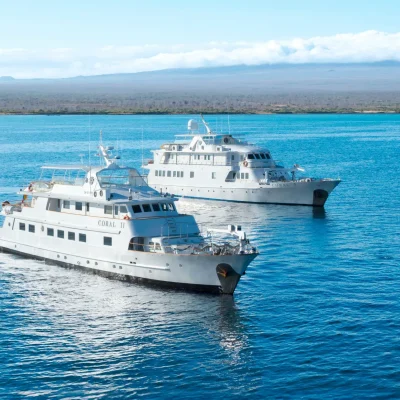
Expedition Yachts Coral I & Coral II
Coral I & Coral II are gorgeous and comfortable sister yachts. They offer charming social areas on three decks with outdoor and interior spaces that allow you to enjoy an intimate expedition experience on your way. They can accommodate 36 and 20 guests, respectively.
Choose your Itineraries
Day 1 - Welcome to Quito

AM: Transfer Quito (airport – hotel).
Welcome to Quito. A representative will welcome you and transfer you to your hotel. You will have free time to explore the city, relax and settle in.
Accommodation: In the 5-Star GO Quito Hotel / Premium Room
Day 2 - Quito Old Town Tour & Middle of the World


AM: Colonial Quito.
Stroll through the busy streets and squares of the most significant historic center of the Americas: a multi-ethnic, artistic, and UNESCO World Heritage Site.
PM: The Middle of the World.
Afterward, our guide will visit the Middle of the World Complex at latitude 0*0*0. Return to the hotel for the night.
Accommodation: In the 5-Star GO Quito Hotel / Premium Room
Day 3 - Welcome to Galapagos & Santa Cruz Island


AM: Welcome to Galapagos. Departure from either Quito or Guayaquil to Baltra Island is a 2 1⁄2 hour flight. Upon arrival in the Galapagos, passengers are greeted at the airport by our knowledgeable guides who will accompany them on a short ten-minute bus ride to the pier where they will board the Coral I or Coral II.
PM: Punta Carrion (Santa Cruz Island). Dinghy ride at the entry of the Itabaca Channel in a lagoon with turquoise water, where we can observe sharks, blue-footed boobies, and different kinds of fish.
Day 4 - Genovesa Island


AM: El Barranco (Genovesa Island). Be marveled at the variety of sea life that uses the crevices of the lava cliffs for shelter. Red-billed Tropicbirds fly overhead, and a small colony of fur seals may be found near the landing site. You will be dropped off at a steep stairway that begins on rocks at the foot of a path that leads through a seabird colony full of Nazca and Red- footed Boobies.
PM: Darwin Bay (Genovesa Island). From within the flooded caldera of Tower Island, we set foot onto a sandy beach to be greeted by swallow- tailed gulls often said to be the most beautiful gull in the world. In the trail we can see at nesting red- footed boobies and great frigatebirds.
Day 5 - Rabida Island & Bartolome Island


AM: Rabida Island. Lying at the archipelago’s heart, this dramatic island with a distinctive red-sand beach is home to sea lions, mockingbirds, finches, endemic Galapagos doves, and vermilion flycatchers. A walk takes us through a forest of palo santo and cacti to a beautiful overview of the bay.
PM: Bartolome Island. Considered the most iconic landscape of the entire archipelago the view from the top of Bartolome Island, overlooking the famous Pinnacle Rock and the austere Santiago Island, Our subsequent snorkel here might put us face to face with Galapagos penguins, white- tipped reef sharks, and playful sea lions.
Day 6 - Santa Cruz Island


AM: Highlands – In the central highlands of Santa Cruz Island, we have our best opportunity to interact at close quarters with totally wild, Galapagos giant tortoises. A short walk among these huge, 600lb, reptiles will also offer the chance for more species, especially several species of the famed finches.
Charles Darwin Research Station – We visit the Station where the Galapagos giant tortoise breeding program takes places as part o f our efforts to preserve the fragile Galapagos environment.
PM: Black Turtle Cove (Santa Cruz Island). On the north shore of Santa Cruz Island, accessible only by sea, four species of mangrove crowd and form an internal lagoon, turtles visit the calm waters, peaking their heads above the surface while fish, rays circle below. White-tipped reef sharks can be seen beneath the boat, plus sea birds, including pelicans, herons and egrets. This cove has been declared as a “turtle sanctuary”.
Day 7 - Isabela Island & Fernandina Island


AM: Punta Vicente Roca (Isabela Island). Spectacular site, surrounded by immense cliffs of an eroded volcano. Studded with resting seabirds like brown noddies and Nazca boobies. Superb snorkeling with unique fish species. Swim with penguins and green turtles.
PM: Punta Espinosa (Fernandina Island). Pristine Fernandina, the marine iguana capital. Its desolate volcanic backdrop hosts a massive concentration of these enigmatic reptiles. Surprisingly, Galapagos penguins share the same shoreline. Snorkeling offers an exciting opportunity to witness marine iguanas feeding underwater, alongside penguins, turtles, and unique flightless cormorants.
Day 8 - Isabela Island


AM: Urbina Bay (Isabela Island). At the far end of a long level hike, we arrive at a strange phenomenon where large blocks of coral lie completely exposed after a dramatic geological uplift in 1954. Located at the western base of Alcedo Volcano, we hope to run into a few impressive land iguanas and some volcanoes endemic to Galapagos giant tortoises during the wet season
PM: Tagus Cove (Isabela Island). Tagus Cove, a historic pirate hideout and anchorage. Visited by Charles Darwin and the HMS Beagle in 1835. Hike past Darwin Lake and stunning volcanic landscape, revealing Isabela island’s dramatic northern volcanoes. Snorkel along a submerged wall with turtles, fish, penguins, and flightless cormorants. Enjoy a panga ride or kayak for added excitement!
Day 9 - Santiago Island


AM: Egas Port (Santiago Island). The black volcanic sand sets this landing apart from most, it’s best known for the dramatic shoreline where we meet a host of species that chose to live between land and sea. Among these are the endemic Galapagos fur seals, which maintain a small colony at the end of our walk.
PM: Sullivan Bay (Santiago Island). It has an extensive features relative to young pa-hoe-hoe lava flows formed during the last quarter of the 19th century. In the middle of the lava flow, older reddish-yellow-colored tuff cones appear. Mollugo plants with their yellow-to-orange whorled leaves usually grow out of the fissures. Walking on solidified lava gives the impression of being on another planet.
Day 10 - Santa Cruz Island & Baltra Island Airport

AM: Bachas Beach (Santa Cruz Island). Named for some wrecked World War II barges whose ribs are still visible in the sand this visitor site offers great swimming, a lovely walk along the shore, and a visit to a lagoon behind the high tide line with wading birds, marine iguanas and sometimes even flamingoes. The two beaches are also favorite nesting sites for green turtles which often leave tractor-like tracks in the sand.
Baltra Island Airport. After the visit, passengers will be transferred to the airport for their return flight to Guayaquil or Quito.
Day 11 - Back to Quito

AM: Transfer to Quito airport.
Transfer to Quito airport, or guests can also extend their stay in Ecuador with other land tours we offer.
Accommodation: In the 5-Star Go Quito Hotel / Premium Room
Wildlife by expedition

Galapagos Penguin

Flightless Cormorant

Mockingbird

Galapagos Hawk

Nazca Booby

Darwin Finch
Day 1 - Welcome to Quito

AM: Transfer Quito (airport – hotel).
Welcome to Quito. A representative will welcome you and transfer you to your hotel. You will have free time to explore the city, relax and settle in.
Accommodation: In the 5-Star GO Quito Hotel / Premium Room
Day 2 - Quito Old Town Tour & Middle of the World


AM: Colonial Quito.
Stroll through the busy streets and squares of the most significant historic center of the Americas: a multi-ethnic, artistic, and UNESCO World Heritage Site.
PM: The Middle of the World.
Afterward, our guide will visit the Middle of the World Complex at latitude 0*0*0. Return to the hotel for the night.
Accommodation: In the 5-Star GO Quito Hotel / Premium Room
Day 3 - Welcome to Galapagos & Santa Cruz Island


AM: Welcome to Galapagos. Departure from either Quito or Guayaquil to Baltra Island is a 2 1⁄2 hour flight. Upon arrival in the Galapagos, passengers are greeted at the airport by our knowledgeable guides who will accompany them on a short ten- minute bus ride to the pier where they will board the Coral I or Coral II.
PM: Black Turtle Cove (Santa Cruz Island). Here we can find four species of mangrove in the extensive tidal lagoon system that stretches for almost a mile inland. During our panga ride through the labyrinth we will spot many turtles, herons of several species, sharks and rays. The experience is otherworldly and seems to transport us back to the beginning of time.
Day 4 - Isabela Island & Fernandina Island


AM: Punta Vicente Roca (Isabela Island). Spectacular site, surrounded by immense cliffs of an eroded volcano. Studded with resting seabirds like brown noddies and Nazca boobies. Superb snorkeling with unique fish species. Swim with penguins and green turtles.
PM: Punta Espinosa (Fernandina Island). Pristine Fernandina, the marine iguana capital. Its desolate volcanic backdrop hosts a massive concentration of these enigmatic reptiles. Surprisingly, Galapagos penguins share the same shoreline. Snorkeling offers an exciting opportunity to witness marine iguanas feeding underwater, alongside penguins, turtles, and unique flightless cormorants.
Day 5 - Isabela Island


AM: Urbina Bay (Isabela Island). At the far end of a long level hike, we arrive at a strange phenomenon where large blocks of coral lie completely exposed after a dramatic geological uplift in 1954. Located at the western base of Alcedo Volcano, we hope to run into a few impressive land iguanas and some volcanoes endemic to Galapagos giant tortoises during the wet season.
PM: Tagus Cove (Isabela Island). Tagus Cove, a historic pirate hideout and anchorage. Visited by Charles Darwin and the HMS Beagle in 1835. Hike past Darwin Lake and stunning volcanic landscape, revealing Isabela island’s dramatic northern volcanoes. Snorkel along a submerged wall with turtles, fish, penguins, and flightless cormorants. Enjoy a panga ride or kayak for added excitement!
Day 6 - Santiago Island


AM: Egas Port (Santiago Island). The black volcanic sand sets this landing apart from most, it’s best known for the dramatic shoreline where we meet a host of species that chose to live between land and sea. Among these are the endemic Galapagos fur seals, which maintain a small colony at the end of our walk.
PM: Sullivan Bay (Santiago Island). It has an extensive features relative to young pa-hoe-hoe lava flows formed during the last quarter of the 19th century. In the middle of the lava flow, older reddish-yellow-colored tuff cones appear. Mollugo plants with their yellow-to-orange whorled leaves usually grow out of the fissures. Walking on solidified lava gives the impression of being on another planet.
Day 7 - Santa Cruz Island & North Seymour Island


AM: Bachas Beach – Named for some wrecked World War II barges whose ribs are still visible in the sand this visitor site offers great swimming, a lovely walk along the shore, and a visit to a lagoon behind the high tide line with wading birds, marine iguanas and sometimes even flamingoes.
Pitt Craters – The Pit Craters, geologically speaking, were not directly formed by volcanic action. They were created as a result of the collapse or sinking of surface materials into cracks or manholes.
PM: North Seymour Island. This flat, uplifting, island is an important spot to see both magnificent and great frigatebird males courting the females and, we will also likely see courting blue-footed boobies too. Sea lions, swallow-tailed gulls, crashing surf and distant views of the Daphne Islands top off a great visit.
Day 8 - Santa Cruz Island & Mosquera Islet


AM: Charles Darwin Research Station (Santa Cruz Island). Once home to the famous Lonesome George, the last tortoise of the Pinta race. The center is set in the Galapagos National Park Service where various interpretative buildings are available to visit. The grounds, with large stands of native vegetation are one of the better places to spot some of the seldom seen Darwinís finches.
PM: Mosquera Islet. This tiny, low-lying islet, converted into coral sand, is set between the north and south Seymour Islands. It’s home to a group of sea lions that come to laze on the soft white sand, it’s an excellent spot to observe shorebirds, herons, lava gulls, and boobies. Snorkeling or diving here, one can often see sharks, rays, and barracudas.
Day 9 - South Plaza Island & Santa Fe Island


AM: South Plaza Island. Sea lions, swallow-tailed gulls, and land iguanas are all present at the landing site. The small island is covered with a carpet of a red succulent studded with Opuntia cacti. At the cliff edge, we spend time watching birds like frigatebirds, flocks of Galapagos shearwaters, and of particular note, flights of displaying red-billed tropicbirds.
PM: Santa Fe Island. After a fabulous snorkel in the turquoise waters of the protected bay, we may have enjoyed time with sea lions, turtles, reef sharks and spotted eagle rays. Landing on a sandy beach, we spend time watching the abundant sea lions there with us and . We begin a walk past a forest of island-endemic giant Opuntia cacti and we can watch the Santa Fe land Iguana.
Day 10 - Lobos Island & San Cristobal Airport

AM: Lobos Island. Isla Lobos is approximately 20 minutes by boat from Puerto Baquerizo Moreno. Once on the island, the trail is about 850 meters and there will be rocky trails and a nice & easy sand trail too. There is a small population of blue-footed boobies and great frigatebirds nests at this site.
San Cristobal Airport. After the visit, passengers will be transferred to the airport for their return flight to Guayaquil or Quito.
Day 11 - Back to Quito

AM: Transfer to Quito airport.
Transfer to Quito airport, or guests can also extend their stay in Ecuador with other land tours we offer.
Accommodation: In the 5-Star Go Quito Hotel / Premium Room
Wildlife by expedition

Galapagos Penguin

Flightless Cormorant

Mockingbird

Galapagos Hawk

Nazca Booby

Darwin Finch
Day 1 - Welcome to Quito

AM: Transfer Quito (airport – hotel).
Welcome to Quito. A representative will welcome you and transfer you to your hotel. You will have free time to explore the city, relax and settle in.
Accommodation: In the 5-Star GO Quito Hotel / Premium Room
Day 2 - Quito Old Town Tour & Middle of the World


AM: Colonial Quito.
Stroll through the busy streets and squares of the most significant historic center of the Americas: a multi-ethnic, artistic, and UNESCO World Heritage Site.
PM: The Middle of the World.
Afterward, our guide will visit the Middle of the World Complex at latitude 0*0*0. Return to the hotel for the night.
Accommodation: In the 5-Star GO Quito Hotel / Premium Room
Day 3 - Welcome to Galapagos & North Seymour Island


AM: Welcome to Galapagos. Departure from either Quito or Guayaquil to Baltra Island is a 2 1⁄2 hour flight. Upon arrival in the Galapagos, passengers are greeted at the airport by our knowledgeable guides who will accompany them on a short ten- minute bus ride to the pier where they will board the Coral I or Coral II.
PM: North Seymour Island. This flat, uplifting, island is an important spot to see both magnificent and great frigatebird males courting the females and, we will also likely see courting blue-footed boobies too. Sea lions, swallow-tailed gulls, crashing surf and distant views of the Daphne Islands top off a great visit.
Day 4 - Santa Cruz Island & Mosquera Islet


AM: Charles Darwin Research Station (Santa Cruz Island). Once home to the famous Lonesome George, the last tortoise of the Pinta race. The center is set in the Galapagos National Park Service where various interpretative buildings are available to visit. The grounds, with large stands of native vegetation are one of the better places to spot some of the seldom seen Darwinís finches.
PM: Mosquera Islet. This tiny, low-lying islet, converted into coral sand, is set between the north and south Seymour Islands. It’s home to a group of sea lions that come to laze on the soft white sand, it’s an excellent spot to observe shorebirds, herons, lava gulls, and boobies. Snorkeling or diving here, one can often see sharks, rays, and barracudas.
Day 5 - South Plaza Island & Santa Fe Island


AM: South Plaza Island. Sea lions, swallow-tailed gulls, and land iguanas are all present at the landing site. The small island is covered with a carpet of a red succulent studded with Opuntia cacti. At the cliff edge, we spend time watching birds like frigatebirds, flocks of Galapagos shearwaters, and of particular note, flights of displaying red-billed tropicbirds.
PM: Santa Fe Island. After a fabulous snorkel in the turquoise waters of the protected bay, we may have enjoyed time with sea lions, turtles, reef sharks and spotted eagle rays. Landing on a sandy beach, we spend time watching the abundant sea lions there with us and . We begin a walk past a forest of island-endemic giant Opuntia cacti and we can watch the Santa Fe land Iguana
Day 6 - Lobos Island & San Cristobal Island


AM: Lobos Island. Isla Lobos is approximately 20 minutes by boat from Puerto Baquerizo Moreno. Once on the island, the trail is about 850 meters and there will be rocky trails and a nice & easy sand trail too. There is a small population of blue-footed boobies and great frigatebirds nests at this site.
PM: Interpretation Center & Frigatebird Hill (San Cristobal Island). The interpretation center is full of interesting information and offers a perfect view of the formation of the Galapagos. After a hike to Cerro Tijeretas, we will have a great view of the two species of frigate birds, along with a beautiful view of the bay.
Day 7 - San Cristobal Island


AM: Kicker Rock – This ancient and eroded volcanic tuff lava named Leon Dormido or Kicker Rock, is formed from two rocks approximately 148 m, named for its resemblance to a sleeping lion.
Cerro Brujo – From our dinghy ride, as we head to shore, we are first humbled by the immensity of the stunning cliffs of the Sorcerer’s Hill. You can enjoy simply sharing the beach with sea lions, snorkelling from shore, or taking a walk to a hidden lagoon.
PM: Punta Pitt (San Cristobal Island). This is the only place on the islands where we will enjoy the chance to see all three of the booby species in the same place. The red-foots will be perched on the Cordia lutea and small trees, the Nazca ́s on the ground near the cliff edge while the blue-foots will be a little further inland. Frigatebirds will be all around and the views are breathtaking.
Day 8 - Española Island


AM: Punta Suarez (Española Island). Punta Suarez is a naturalist ́s paradise. The oldes extant island in the archipelago is our only opportunity to commune with the endemic wave albatross during their breeding season between April and December. With luck, we can watch their complex courtship display.
PM: Gardner Bay (Española Island). One of the most stunning beaches in all of the Galapagos. The long, white, sandy beach, lapped by turquoise waters, home to a colony of Galapagos sea lions. Hood mockingbirds, endemic to this particular island. We can also snorkel here from the beach, in the shallows of the bay.
Day 9 - Floreana Island


AM: Cormoran or Champion (Floreana Island). Our walk takes us to a large, shallow lagoon, often inhabited by a variable number of shockingly pink greater flamingos. We arrive at a powdery white beach, a nesting area for green turtles.
PM: Post Office (Floreana Island). The famous Post Office Barrel. Claimed to have been first set up in 1793 by Captain James Colnett. The system involved whalers and fur sealers would leave addressed letters in the barrel to be picked up by homeward-bound colleagues. Actually visitors often take letters and hand-deliver them to their home countries.
Day 10 - Santa Cruz Island & San Cristobal Airport

AM: Highlands (Santa Cruz Island). Dry landing. In the Galapagos mountains, admire diverse bird species like finches, flycatchers, crakes, warblers, and egrets (often perched on tortoises’ shells). The journey to the reserve showcases the island’s contrasting ecosystems, from coastal areas to dense humid forests. Look out for Galapagos Giant tortoises wandering through pastures. This spot is a haven for birdwatchers, as it hosts a wide range.
San Cristobal Airport. After the visit, passengers will be transferred to the airport for return flight to Quito or Guayaquil.
Day 11 - Back to Quito

AM: Transfer to Quito airport.
Transfer to Quito airport, or guests can also extend their stay in Ecuador with other land tours we offer.
Accommodation: In the 5-Star Go Quito Hotel / Premium Room
Wildlife by expedition

Galapagos Penguin

Galapagos Albatross

Mockingbird

Galapagos Hawk

Nazca Booby

Darwin Finch
Day 1 - Welcome to Quito

AM: Transfer Quito (airport – hotel).
Welcome to Quito. A representative will welcome you and transfer you to your hotel. You will have free time to explore the city, relax and settle in.
Accommodation: In the 5-Star GO Quito Hotel / Premium Room
Day 2 - Quito Old Town Tour & Middle of the World


AM: Colonial Quito.
Stroll through the busy streets and squares of the most significant historic center of the Americas: a multi-ethnic, artistic, and UNESCO World Heritage Site.
PM: The Middle of the World.
Afterward, our guide will visit the Middle of the World Complex at latitude 0*0*0. Return to the hotel for the night.
Accommodation: In the 5-Star GO Quito Hotel / Premium Room
Day 3 - Welcome to Galapagos & San Cristobal Island


AM: Welcome to Galapagos. Departure from either Quito or Guayaquil to Baltra Island is a 2 1⁄2 hour flight. Upon arrival in the Galapagos, passengers are greeted at the airport by our knowledgeable guides who will accompany them on a short ten- minute bus ride to the pier where they will board the Coral I or Coral II.
PM: Interpretation Center & Frigatebird Hill (San Cristobal Island). The interpretation center is full of interesting information and offers a perfect view of the formation of the Galapagos. After a hike to Cerro Tijeretas, we will have a great view of the two species of frigate birds, along with a beautiful view of the bay.
Day 4 - San Cristobal Island


AM: Kicker Rock – This ancient and eroded volcanic tuff lava named Leon Dormido or Kicker Rock, is formed from two rocks approximately 148 m, named for its resemblance to a sleeping lion.
Cerro Brujo – From our dinghy ride, as we head to shore, we are first humbled by the immensity of the stunning cliffs of the Sorcerer’s Hill. You can enjoy simply sharing the beach with sea lions, snorkelling from shore, or taking a walk to a hidden lagoon.
PM: Punta Pitt (San Cristobal Island). This is the only place on the islands where we will enjoy the chance to see all three of the booby species in the same place. The red-foots will be perched on the Cordia lutea and small trees, the Nazca ́s on the ground near the cliff edge while the blue-foots will be a little further inland. Frigatebirds will be all around and the views are breathtaking.
Day 5 - Española Island


AM: Punta Suarez (Española Island). Punta Suarez is a naturalist ́s paradise. The oldes extant island in the archipelago is our only opportunity to commune with the endemic wave albatross during their breeding season between April and December. With luck, we can watch their complex courtship display.
PM: Gardner Bay (Española Island). One of the most stunning beaches in all of the Galapagos. The long, white, sandy beach, lapped by turquoise waters, home to a colony of Galapagos sea lions. Hood mockingbirds, endemic to this particular island. We can also snorkel here from the beach, in the shallows of the bay.
Day 6 - Floreana Island


AM: Cormoran or Champion (Floreana Island). Our walk takes us to a large, shallow lagoon, often inhabited by a variable number of shockingly pink greater flamingos. We arrive at a powdery white beach, a nesting area for green turtles.
PM: Post Office (Floreana Island). The famous Post Office Barrel. Claimed to have been first set up in 1793 by Captain James Colnett. The system involved whalers and fur sealers would leave addressed letters in the barrel to be picked up by homeward-bound colleagues. Actually visitors often take letters and hand-deliver them to their home countries.
Day 7 - Santa Cruz Island


AM: Highlands Tortoise Reserve – We have our best opportunity to interact at close quarters with totally wild, Galapagos giant tortoises. A short walk among these huge, 600lb, reptiles will also offer the chance for more highland species, especially several species. of the famed finches.
Charles Darwin Research Station – We visit the Station where the Galapagos giant tortoise breeding program takes places as part of our efforts to preserve the fragile Galapagos environment.
PM: Punta Carrion (Santa Cruz Island). Dinghy ride at the entry of the Itabaca Channel in a lagoon with turquoise water, where we can observe sharks, blue-footed boobies, and different kinds of fish.
Day 8 - Genovesa Island


AM: El Barranco (Genovesa Island). Be marveled at the variety of sea life that uses the crevices of the lava cliffs for shelter. Red-billed Tropicbirds fly overhead, and a small colony of fur seals may be found near the landing site. You will be dropped off at a steep stairway that begins on rocks at the foot of a path that leads through a seabird colony full of Nazca and Red- footed Boobies.
PM: Darwin Bay (Genovesa Island). From within the flooded caldera of Tower Island, we set foot onto a sandy beach to be greeted by swallow- tailed gulls often said to be the most beautiful gull in the world. In the trail we can see at nesting red-footed boobies and great frigatebirds.
Day 9 - Rabida Island & Bartolome Island


AM: Rabida Island. Lying at the archipelago’s heart, this dramatic island with a distinctive red-sand beach is home to sea lions, mockingbirds, finches, endemic Galapagos doves, and vermilion flycatchers. A walk takes us through a forest of palo santo and cacti to a beautiful overview of the bay.
PM: Bartolome Island. Considered the most iconic landscape of the entire archipelago the view from the top of Bartolome Island, overlooking the famous Pinnacle Rock and the austere Santiago Island, Our subsequent snorkel here might put us face to face with Galapagos penguins, white- tipped reef sharks, and playful sea lions.
Day 10 - Santa Cruz Island & Baltra Island Airport

AM: Pit Craters (Santa Cruz Island). The Pit Craters, geologically speaking, were not directly formed by volcanic action. They were created as a result of the collapse or sinking of surface materials into cracks or manholes. It’s a great place to spot vermilion fly catchers as we walk inside an endemic Scalesia forest. Great opportunity to observe giant tortoises.
Baltra Island Airport. After the visit, passengers will be transferred to the airport for their return flight to Guayaquil or Quito.
Day 11 - Back to Quito

AM: Transfer to Quito airport.
Transfer to Quito airport, or guests can also extend their stay in Ecuador with other land tours we offer.
Accommodation: In the 5-Star Go Quito Hotel / Premium Room
Wildlife by expedition

Galapagos Albatross

Mockingbird

Galapagos Hawk

Nazca Booby

Darwin Finch

Galapagos Pelican
Go Quito Hotel

A unique hotel that offers 151 elegant rooms and lofts with a view of the city, inspired by the Andes. They have a modern home automation system that integrates lighting and heating. It also has a wellness area with a heated pool, sauna, spa, yoga room and a beautiful orchid garden.
Go Quito Hotel, committed to social and environmental responsibility, seeks to reduce its impact through responsible practices to conserve resources, manage energy efficiency and support the well-being of guests and staff.



Included in the rates
What´s Included?

Two daily excursions

Onboard activities

Aquatic activities

All meals included
Included in the rates
- High-quality Galapagos Islands cruise sharing double occupancy.
- On board: 2 daily excursions to the islands with multilingual naturalist guides, snorkeling opportunities (equipment included: fins, mask, snorkel), glass bottom boat (Available in Galapagos Legend), Lectures, and briefings; all meals onboard, welcome and farewell cocktails.
- Roundtrip transfers.
- 3 nights accommodation at Hotel GO Quito 5-stars.
- 3 breakfasts in Quito.
- Luxury Cabins with sea-view, air conditioning and private facilities ( Include one thermos and excursion bag per person.).
- All cabins are equipped with shampoo, conditioner, and shower gel. Body lotion is also available in balcony suites.
- Towels available for personal use: cabin, pool, and during excursions.
- Assistance with check-in and baggage handling at the airport (one piece of luggage, max. 20kls per person).
- Transfers to/from the airport and dinghy rides to/from ports in connection with scheduled flights.
Not included and to be invoiced onboard
Not included and to be invoiced onboard (net in US$ per person subject to change):
⊗ Air ticket from Quito / Guayaquil to Galapagos
– $ 495 per adult
– $ 375 per child under 12 years old
Issued by GO in connection with the cruise itinerary, arranging and securing logistics, luggage, and passenger transfers from airports to port – ship and back, documentation.
⊗ Galapagos Entrance Fee
– $ 100 per adult
– $ 50 for children under 12 years old.
⊗ CGG Migration Control Card: $20 per person.
Supplements & Discounts:
⊗ Single supplement: 50%, except in holiday seasons. (15 Dec – 5 Jan)
⊗ Triple occupancy: 25% discount for a third person sharing a cabin with two full-paying guests. (Only available on Galapagos Legend).
⊗ 50% discount for children under 12 years old sharing a cabin with two full-fare paying guests. 25% discount during the holiday season.
Supplements & Discounts
⊗ Single supplement: 50%, except in holiday seasons. (15 Dec – 5 Jan)
⊗ Triple occupancy: 25% discount for a third person sharing a cabin with two full-paying guests. (Only available on Galapagos Legend).
⊗ 50% discount for children under 12 years old sharing a cabin with two full-fare paying guests. 25% discount during the holiday season.
Optional onboard plus taxes
Optional onboard plus taxes (net per person in US$ subject to change):
- Internet: 4 or 5 days: $79.99. 7 days $99.99
- Wetsuit rental: $25 for 4 or 5 days cruise
- Kayak rental: $45 per use per person.
- Alcoholic and soft drinks: (packages available)
- Scuba diving during GO’s cruises: $315 half-day tour with 1-2 dives and equipment included (pre-booking required).
- Doctor: Medical assistance and medication are additional costs.
- Tips: Suggested per person per day $20 for crew / $10 for guide.
* Note 1: If any other ticket to/from Galapagos is used, a non-refundable operational fee of US$ 90.00 net per person will be added to provide a dinghy ride to/from the ship in Galapagos. GO is not responsible if passengers miss the cruise or other services due to delays in independent arrangements.
- High-quality Galapagos Islands cruise sharing double occupancy, Standard Plus, or Junior Suite cabins.
- On board: 2 daily excursions to the islands with multilingual naturalist guides, snorkeling opportunities, lectures, and briefings; all meals on board, welcome and farewell cocktails;
- Roundtrip transfers.
- 3 nights accommodation at Hotel GO Quito 5 stars.
- 3 breakfasts in Quito.
- All-inclusive cruises in ocean-view cabins with air conditioning and private facilities.
- Open decks to observe flora and fauna, briefings, lectures, and activities on board.
- Snorkeling possibilities, glass bottom boat.
- Snorkeling equipment: fins, mask, snorkel.
- Towels available for personal use: cabin, pool, and during excursions.
- All cabins are equipped with shampoo, conditioner, and shower gel. In addition, body lotion is available in the suites with a balcony.
- Assistance with check-in and baggage handling at the airport (one piece of luggage, max. 20kls per person).
- Transfers to/from the airport and dinghy rides to/from ports in connection with scheduled flights.
- All cabin categories include one thermos and excursion bag per person
Read More
Not included and be invoiced along with the cruise (net in US$ per person subject to change):
⊗ Air ticket from Quito / Guayaquil to Galapagos
– $ 495 per adult
– $ 375 per child under 12 years old
Issued by GO in connection with the cruise itinerary, arranging and securing logistics, luggage, and passenger transfers from airports to port – ship and back, documentation.
⊗ Galapagos Entrance Fee
– $ 100 per adult
– $ 50 for children under 12 years old.
⊗ CGG Migration Control Card: $20 per person.
Supplements & Discounts:
⊗ Single supplement: 50%, except in holiday seasons. (15 Dec – 5 Jan)
⊗ Triple occupancy: 25% discount for a third person sharing a cabin with two full-paying guests. (Only available on Galapagos Legend).
⊗ 50% discount for children under 12 years old sharing a cabin with two full-fare paying guests. 25% discount during the holiday season.
⊗ Single supplement: 50%, except in holiday seasons. (15 Dec – 5 Jan)
⊗ Triple occupancy: 25% discount for a third person sharing a cabin with two full-paying guests. (Only available on Galapagos Legend).
⊗ 50% discount for children under 12 years old sharing a cabin with two full-fare paying guests. 25% discount during the holiday season.
Optional onboard plus taxes (net per person in US$ subject to change):
- Internet: 4 or 5 days: $79.99. 7 days $99.99
- Wetsuit rental: $25 for 4 or 5 days cruise
- Kayak rental: $45 per use per person.
- Alcoholic and soft drinks: (packages available)
- Scuba diving during GO’s cruises: $315 half-day tour with 1-2 dives and equipment included (pre-booking required).
- Doctor: Medical assistance and medication are additional costs.
- Tips: Suggested per person per day $20 for crew / $10 for guide.
what to take on the trip
What to take on the trip
Essentials:
- Passport and Travel Documents
- Cash in US Dollars and bring credit or debit cards
- Your medications for the journey
- Ocean-Friendly Sunblock
- Insect repellent
- Waterproof small backpack
- Photo and video cameras
- Journal


What to Wear?
- Water-resistant, closed-toe sport sandals
- Lightweight hiking shoes
- Lightweight hiking pants or shorts
- Long-sleeve shirts
- Bathing suits
- Warm sweater or fleece
- Wide-brimmed hat or cap
- Sunglasses
Essentials:
- Passport and Travel Documents
- Cash in US Dollars and bring credit or debit cards
- Your medications for the journey
- Ocean-Friendly Sunblock
- Insect repellent
- Waterproof small backpack
- Photo and video cameras
- Journal


What to Wear?
- Water-resistant, closed-toe sport sandals
- Lightweight hiking shoes
- Lightweight hiking pants or shorts
- Long-sleeve shirts
- Bathing suits
- Warm sweater or fleece
- Wide-brimmed hat or cap
- Sunglasses
Optional Full-Day Tour
Enjoy optional Full-Day Tours
Explore more of Ecuador with our additional land tours. Immerse yourself in the diverse landscapes, rich culture, and unique experiences this beautiful country has to offer.
Contact our travel experts.
Contact our travel experts.
CONTACT US
USA: 1888 5055 346
CANADA: 1866 343 1777
UK: 0114 4845 5281 389
Ph: (593) 222 670 00 / (593) 222 670 80
Go Galapagos Ltda. All rights reserved. 1980 - 2025

